Epic Iceland Winter Trip Itinerary for One Week (+Map & Printable Pdf)
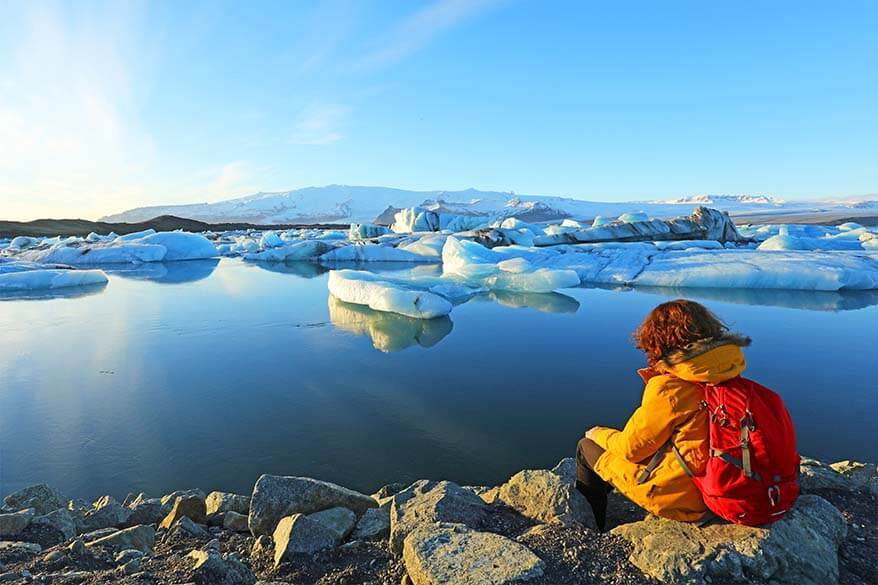
This site contains affiliate links, which means that we may earn a small commission, at no cost to you, for qualifying purchases. It supports the work that goes into keeping this content free. Thanks for reading! More info: Privacy Policy.
Planning a trip to Iceland in winter and wondering where to go and what’s the best way to plan your Iceland winter itinerary? This article features the best one week Iceland trip itinerary for the winter months with all the details you need to plan your trip. You can also download a free printable version of this itinerary.
FEATURED READER COMMENT: “Just got back last night. We followed all of your advice for the 7day self drive option. We had an amazing time… We also saw the northern lights, rode horses at Eldhestar, saw all of the waterfalls and walked the glacier and snow caves… We liked all the hotels we stayed at including Eldhestar, Magma, Foss Glacier and Laki. Thank you for putting this together so clearly! We would never have been able to see everything without this guide!”
⭐⭐⭐⭐⭐ KATHLEEN MCCARRICK
Good to know: This 7-day self-drive Iceland winter itinerary is designed specifically for the winter season, from October to March-April. It starts and ends in Reykjavik and covers all the main landmarks along Iceland’s South Coast and the Golden Circle. It takes into account shorter daylight hours, ensuring you have plenty of time for sightseeing, winter activities, and even some hiking.
Whether you are looking for dramatic landscapes, icy waterfalls, or impressive glaciers, this itinerary will help you experience the very best of Iceland in winter. Plus, you’ll have plenty of chances to look for the Northern Lights!
We made this exact road trip in Iceland in November, so all the info and tips in this guide are based on personal experiences.
Top Winter Experiences To Book in Advance:
- Glacier Hike (day 3).
- Natural Ice Caves (day 4 or day 5).
- Sky Lagoon and/or Blue Lagoon (day 7 and/or day 1). With recent volcano eruptions near the Blue Lagoon, I would play it safe and book Sky Lagoon!
PRO TIP! Reserve your accommodations in advance, especially in the rural areas along the South Coast! Hotels close to Jokulsarlon Glacier Lagoon are the most sought-after, so book those asap. You will find our hotel recommendations for each day in the itinerary below.
7-Day Iceland Winter Trip Itinerary – OVERVIEW
- Important Info & Map
- Day 1: Arrival and drive to Hveragerdi
- Day 2: Golden Circle
- Day 3: Waterfalls, Glacier Hike & Black Sand Beach
- Day 4: Glaciers, Lagoons & Diamond Beach
- Day 5: Ice Caves, Glacier Lagoons & Skaftafell
- Day 6: Fjadrargljufur Canyon, Lava Fields, Waterfalls
- Day 7: Reykjavik & Blue Lagoon or Sky Lagoon
- Alternative (no driving): Reykjavik + day tours
- Practical Tips
- FREE Printable
Important Info & Map
There are some things you really need to know before you start planning your Iceland winter trip itinerary:
- Days are short in Iceland in winter, so you cannot do as much sightseeing as in summer. We visited Iceland in mid-November, when it’s light between 9 AM and 4 PM. To make the most of limited daylight, we started our days at 8.30 AM, before sunrise. By the time we were back at our hotel (at the latest at 5 PM), it was already dark. There is even less light in December-January, so keep this in mind when planning your winter trip to Iceland.
- You will need to rent a car for this trip. We personally use and recommend this website for the best deals for car rental in Iceland and beyond. Don’t forget to get the full insurance! Here you can find more information about driving in Iceland in winter.
- The South Coast is the best region to explore during a winter trip to Iceland. Doing the entire Ring Road and visiting the Eastern and Northern parts of Iceland in winter is not the best idea, unless you are very comfortable with extreme winter weather and driving in ever-changing conditions.
- Important – safety first! If you do not have winter driving experience, book an organized multi-day tour instead of driving. In addition, you can stay in Reykjavik on the first and the last days of your trip and visit the main Reykjavik attractions, including the geothermal baths of the Blue Lagoon and/or Sky Lagoon. That way, you can still see many top places from this itinerary without having to drive.
Here is my hand-picked selection of the best multi-day winter tours:
- 2-Day Tour (South Coast, incl. ice cave).
- 3-Day Tour (Golden Circle, South Coast, incl. ice cave).
- 4-5-6-7-Day Tour (itinerary depends on tour duration).
TIP: If you absolutely want to do the entire Ring Road of Iceland in winter, do yourself a favor and go with an organized tour and a local driver/guide! The roads in the north of Iceland are even more challenging than in the south! You can find some amazing multi-day small-group tours like this 6-day tour or this highly-rated 8-day tour that do the entire Ring Road.
And if you are planning to drive – read on for the best self-drive Iceland winter road trip itinerary!
READ ALSO: Tips for Visiting Iceland in Winter
Here is our recommended self-drive Iceland winter itinerary:
DAY 1: Arrival in Reykjavik Keflavik Airport and Drive to Hveragerdi
Since our flight arrived in the afternoon, we drove straight to our hotel in Hveragerdi where we would stay for 2 nights. This small town is much better situated for Iceland winter trip than Reykjavik as it will save you quite some unnecessary driving in the dark. Furthermore, it has a great geothermal swimming pool. This is an ideal way to spend your first evening in Iceland!
Hveragerdi is also well located for a visit to the Golden Circle which you will visit on day 2 of this itinerary. Staying here, saves quite some driving time for the rest of your journey further down the South Coast of Iceland.
TIP: If your flight arrives early and you have more time to spare, you could opt to spend several hours at the famous geothermal pool Blue Lagoon close to the airport (be sure to reserve tickets in advance!). Alternatively, you can also go to the public pool in Hveragerdi which is a much cheaper and less touristy option.
There are several restaurants in this little town. I recommend eating out as there are more choices and the prices are lower than at the hotels.
WHERE TO STAY: We stayed at Hotel Eldhestar for 2 nights. This hotel also has horses and organizes short riding tours. Alternatively, check out the Greenhouse Hotel – it’s a beautiful contemporary hotel with a unique concept.
One of the main reasons why I traveled to Iceland in winter was my long-time dream to see Northern Lights. So on the first night already, we went ‘hunting’ for auroras. They were very vague and better visible in the pictures than in reality, but it was just the first night, so it gave us hope.
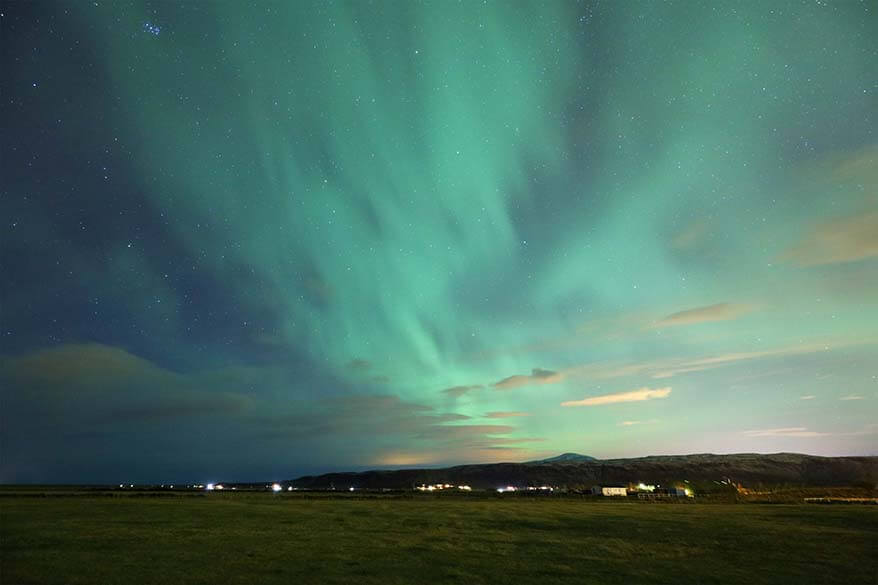
DAY 2: Golden Circle: Thingvellir NP – Geysir – Gullfoss Waterfall
Iceland’s must-do day trip is the visit to the famous Golden Circle. It’s possible to do it as a day trip from Reykjavik as well.
The Golden Circle refers to three main attractions – Thingvellir National Park, Geysir geothermal area, and Gullfoss Waterfall.
We started our day at Thingvellir National Park. It was just magical in the soft morning light of a never-ending sunrise…
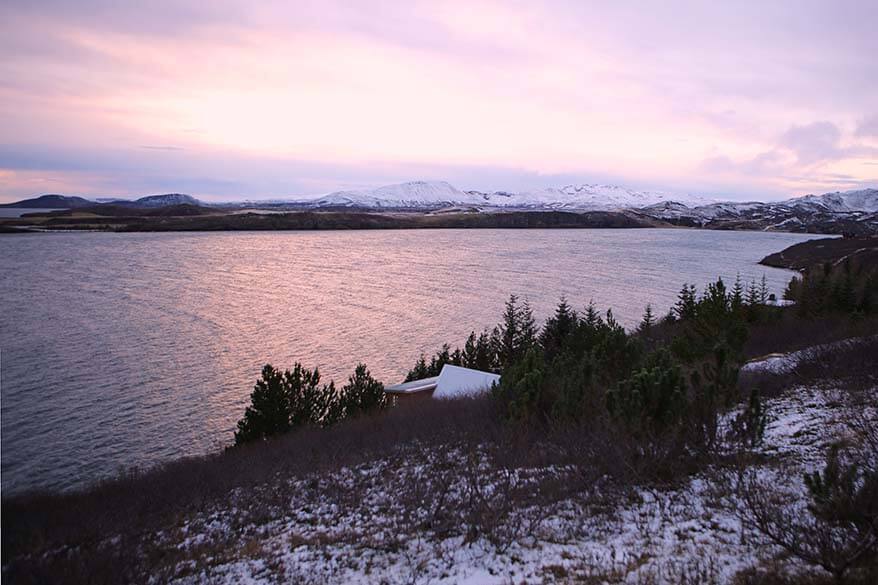
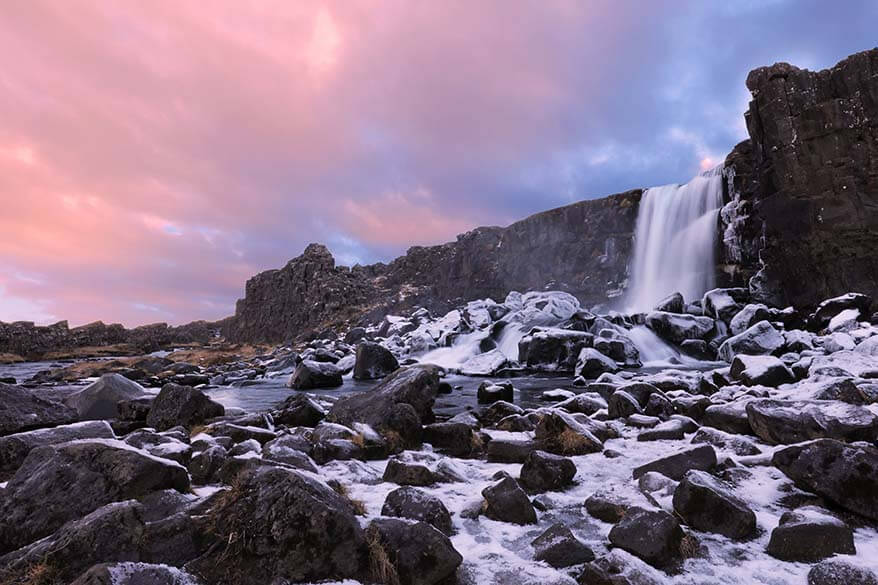
We then continued to the Geysir area where we also had an early lunch.
Strokkur Geyser is the main attraction here and one of the must-sees in Iceland. This geyser erupts every 5-7 minutes, so you can watch it in action several times.
If you have more time, you can walk around and explore this geothermal area deeper. Near Strokkur Geyser, you can also see Geysir. This is the original geyser that was first mentioned in written sources in Europe and it gave name to all others. However, this geyser is dormant and there hasn’t been an eruption for years.
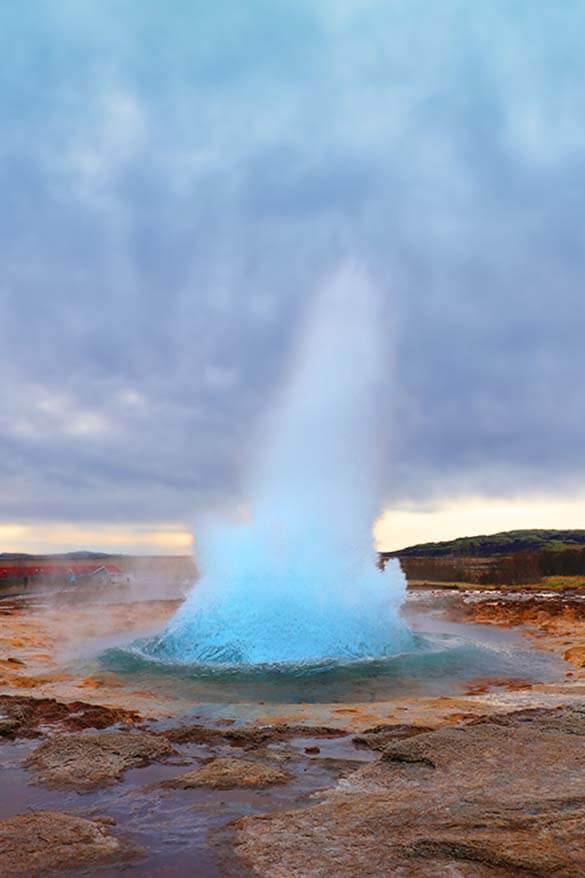
In the afternoon we visited one of Iceland’s most beautiful waterfalls, the Golden Waterfall – Gullfoss.
The area around this waterfall is quite large and can be explored via a series of boardwalks and staircases. In the summer, you can walk really close to the waterfall, but in the winter, it’s very icy and the path is closed.
Don’t worry though – the best views are accessible, just be careful as it can be very slippery everywhere (that’s why we recommend packing snow traction cleats for your winter trip to Iceland).
TIP: End your day in one of the nicest geothermal pools of Iceland, Secret Lagoon. It’s ideally located on the way from Gullfoss back to your hotel in Hveragerdi. Alternatively, there is also a more expensive option – Laugarvatn Fontana Geothermal Baths, which is also located in this area.
WHERE TO STAY: The same hotel as on the previous night.
READ ALSO: What to Wear in Iceland in Winter
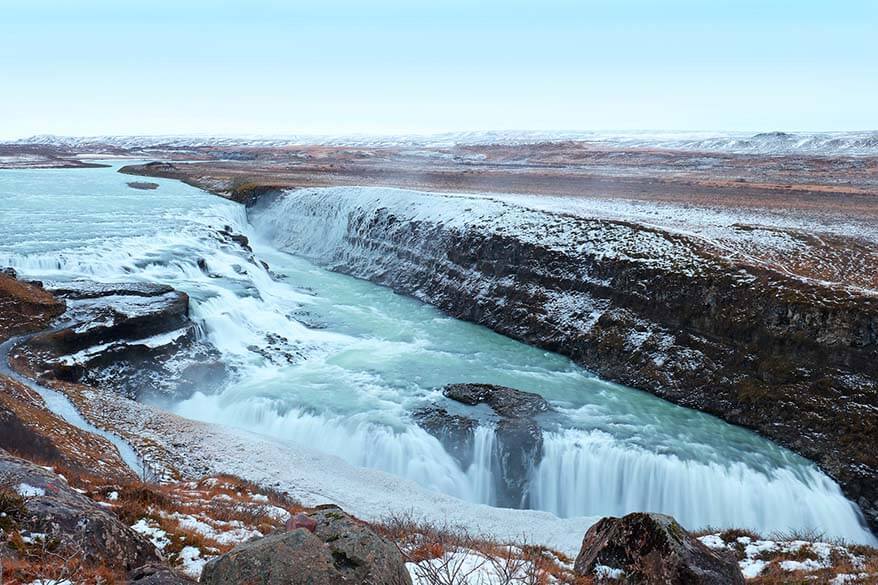
DAY 3: Skogafoss Waterfall – Glacier Hiking – Reynisfjara (Vik)
Our first stop on day 3 of our Iceland winter trip was at another iconic landmark of Iceland – the Skogafoss Waterfall.
This is one of the most impressive landmarks along the South Coast of Iceland and no pictures do it justice.
The best view is from the base of the waterfall which is just near the car parking. However, if it’s not too cold or slippery on the stairs, I encourage you to make an effort and go all the way to the top of the waterfall. The views are well worth the steep climb!
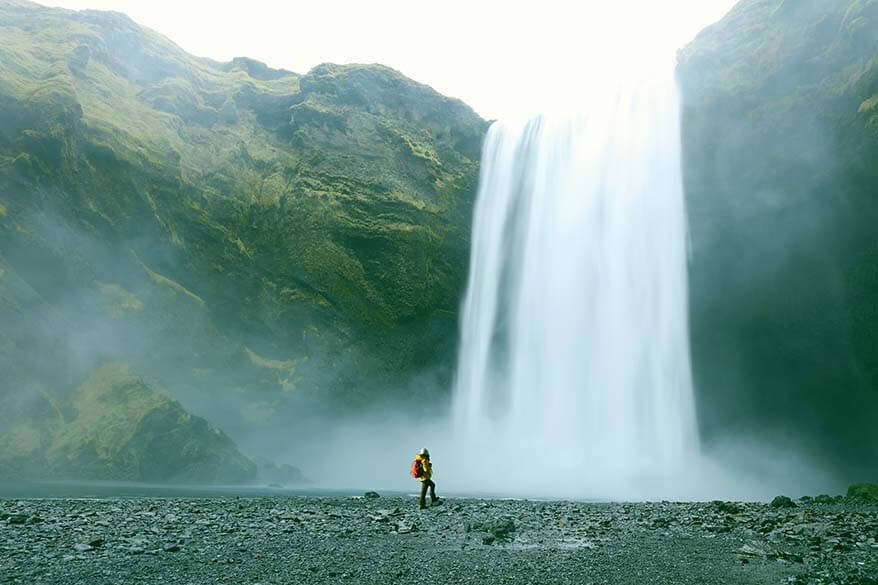
After a visit here, we had a quick lunch on the way and continued to Solheimajokull glacier for a guided glacier hike.
TIP: Book your glacier hike in advance – this will help you plan your time better and you will be certain you can do this activity. Otherwise, it might be difficult to even know where to look. Most companies have their offices in Reykjavik and so there is no one around to even ask for information.
- You can book a short guided glacier walk on Sólheimajökull. This tour fits this itinerary the best as it starts at Sólheimajökull Café, not too far from Skogar Museum.
- Vatnajökull Glacier Blue Ice Cave Tour is another great winter tour! If you want to visit a natural ice cave, it’s best to do it near Jokulsarlon Glacier Lagoon on day 4 or day 5 of this itinerary.
LEARN MORE: Glacier Hiking in Iceland
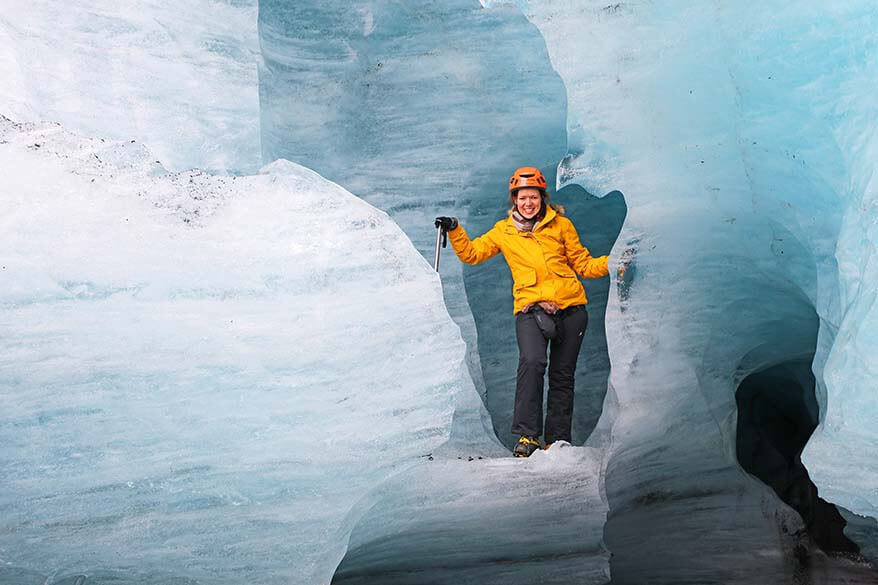
If glacier hiking or ice caving is not your thing, you can visit the Skogar Museum.
It is divided into three parts: folk museum, turf houses, and transport museum. The turf houses are well worth seeing.
In summer you could easily do both – glacier hiking and Skogar museum, but in winter your sightseeing time in Iceland is limited and you have to choose and plan well.
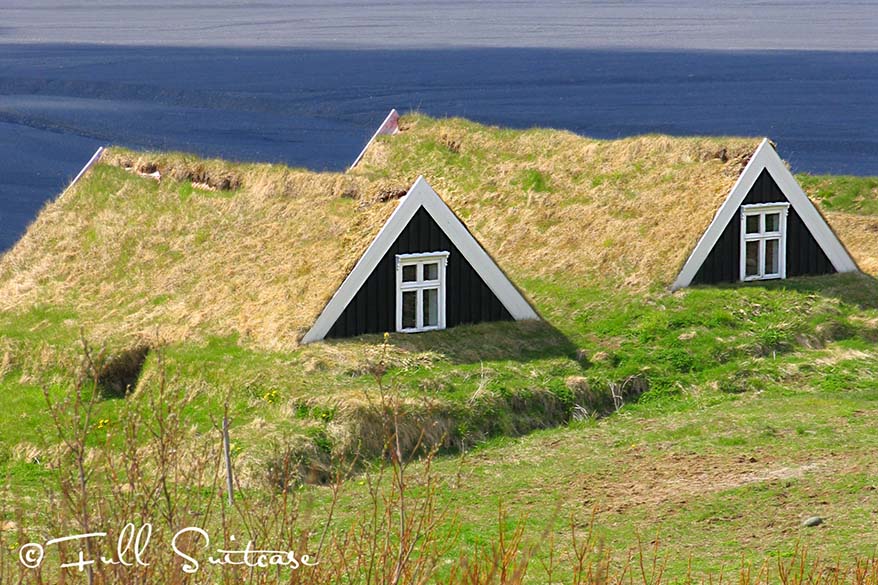
After the glacier walk, we drove to the beautiful black sand beach at Reynisfjara (near Vik). This beach is famous for its black sand, rock formations, and impressive basalt columns. It’s one of the places that’s included in all Iceland itineraries, so it attracts lots of people.
This is really one of the must-sees in Iceland and the beach is beautiful and worth a visit in any season and in any weather.
Good to know: The waves here are very sneaky, often flooding the entire beach unexpectedly. It often happens that people are swept off their feet and there have been quite a few serious accidents too. So never walk close to the water here and never turn your back to the sea!
TIP: There is a small cafe where you can get some warm drinks and hide from the wind and the cold for a couple of minutes.
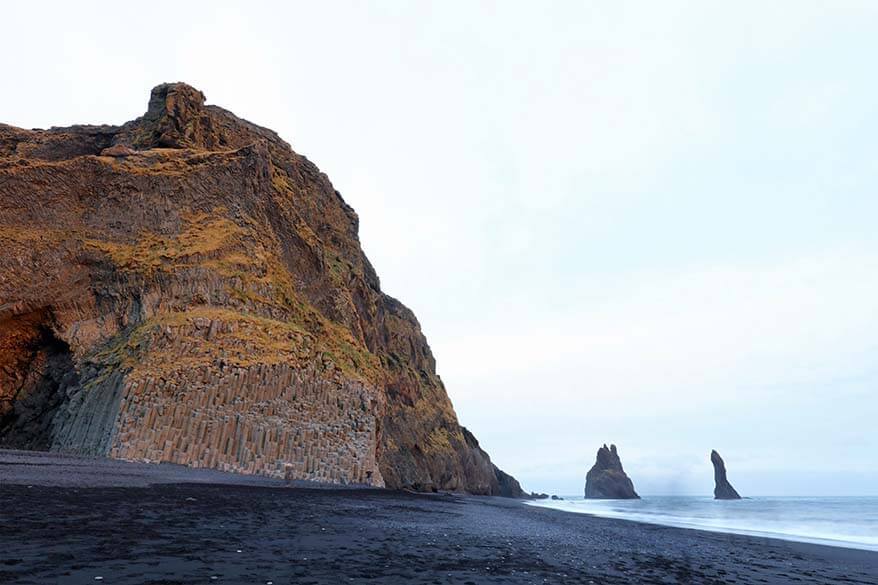
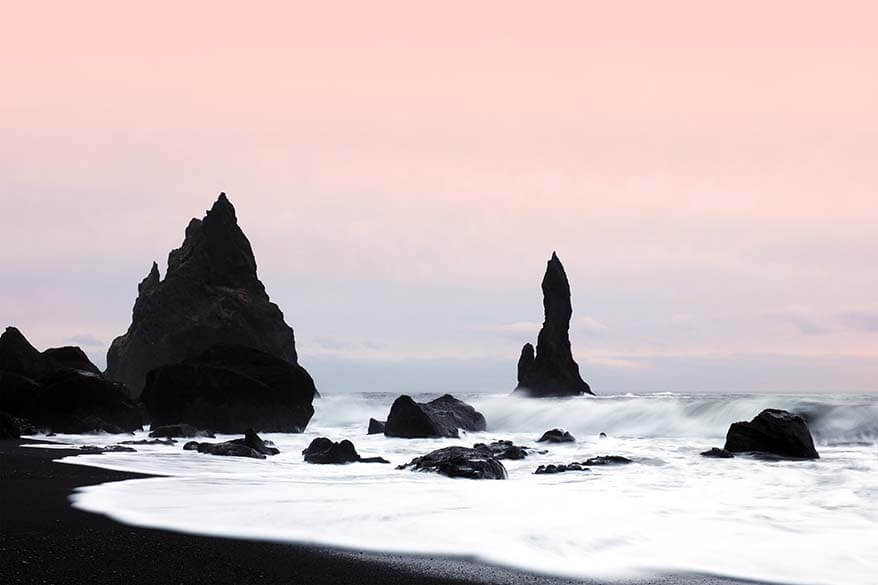
It was so beautiful on the beach that we stayed until the dark. Sunsets are truly out of this world in Iceland in winter!
TIP: There is a new attraction in Vik – Icelandic Lava Show – that wasn’t yet open when we visited. It’s indoors, is open late every day, and it would be a very nice addition to this winter itinerary. If you want to see and feel the heat of real lava, don’t miss this unique opportunity. Book your tickets in advance!
WHERE TO STAY: We recommend staying in the Kirkjubaejarklaustur area. On this winter trip, we stayed at Hotel Laki. Nicer options in this area (based on our other trips) are Hotel Klaustur and Hótel Hrífunes.
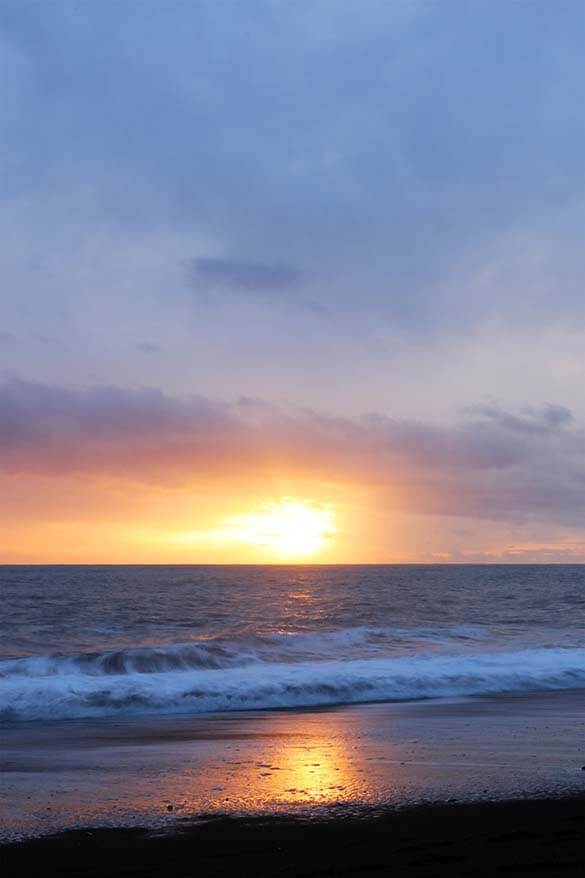
DAY 4: Vatnajokull Glacier – Jokulsarlon Glacier Lagoon – Diamond Beach
On the fourth day of this winter trip, we continued along the South Coast all the way up to the famous Jokulsarlon Glacier Lagoon.
Our first stop was at Svinafellsjokull Glacier where we made a short walk to one of the many tongues of Vatnajokull Glacier.
This is just a short walk from the parking and is normally doable in winter too. The views are worth it.
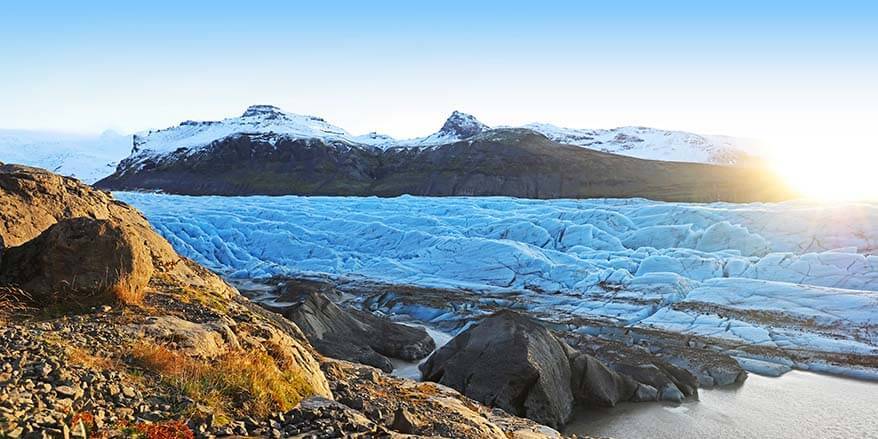
In the early afternoon, we reached Jokulsarlon Glacier Lagoon.
If there is one place you don’t want to miss in Iceland, it’s Jokulsarlon! I’ve been here so many times, in different seasons and all kinds of weather, and it never disappoints.
On this winter trip, we were extremely lucky with the weather and the glacial lake was simply spectacular.
In the summer, you can take a boat trip between the icebergs, but these tours don’t run in the winter. You are not missing much though. You can walk along the coastline of the lagoon and the scenery is just as stunning.
TIP: If you want to visit a natural ice cave in Iceland, the Jokulsarlon area is the best place for that. Just be sure to book an ice cave tour in advance. Late afternoon on this day would be a good moment to do it or – likely more relaxing – first thing in the morning on the next day.
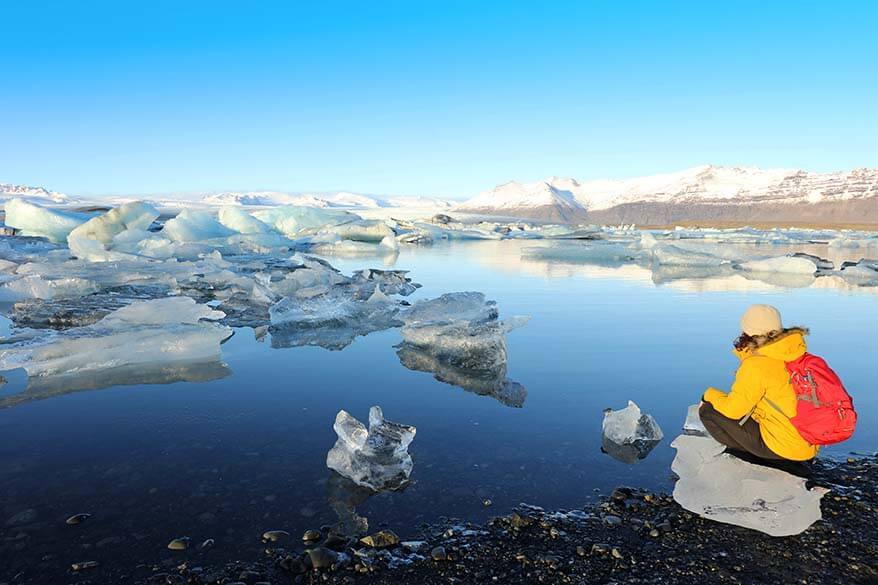
TIP: Don’t miss the so-called Diamond Beach just across the road from Jokulsarlon, and certainly when visiting Iceland in winter.
This beach is located just where the floating icebergs from the nearby lagoon reach the sea. With the wind, many of the icebergs are washed ashore. The cold temperatures and the wind turn this coastline into an amazing winter wonderland.
In the summer, the beach is often empty, or there are just a few smaller pieces of ice. In the winter, you can sometimes see huge chunks of ice here. It’s like walking between the giant diamonds. Absolutely breathtaking!
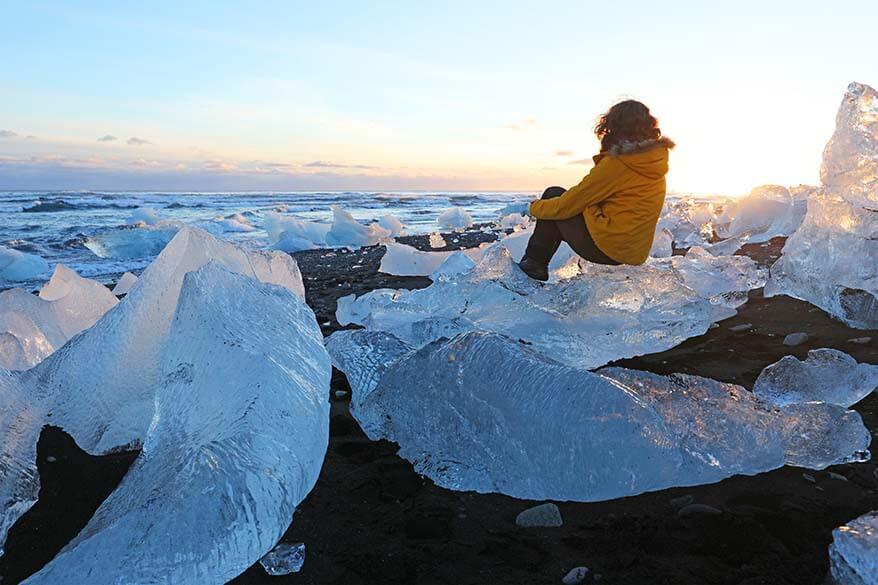
We stayed on Diamond Beach till sunset and seeing all those icebergs lit up with the setting sun was an unforgettable experience.
I found Jokulsarlon Diamond Beach even more impressive in the winter than the famous Jokulsarlon glacier lagoon itself.
Good to know: There are two beaches here, one on each side of the bridge. Depending on the wind direction, there might be more ice on one side than on the other. So look around when you are there before deciding which one to visit. And if both look nice and you have time, visit both!
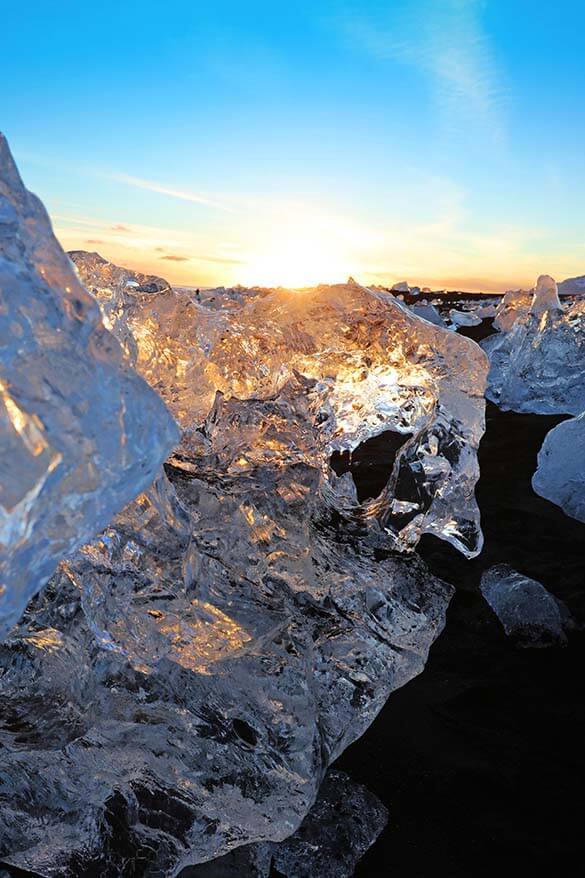
WHERE TO STAY: Our hotel for the night was Hotel Smyrlabjorg. If there is still availability, however, I recommend staying at the Fosshotel Glacier Lagoon – it’s the nicest hotel in the area!
PRO TIP: This area has very limited accommodation options, so you really have to book a hotel here as soon as you know your travel dates!
Iceland is one of the best places in the world to see the Northern Lights. If you spend a week there in winter and actively go out looking, your chances of catching them at least once or twice are pretty high. We went aurora hunting every night, and the display we saw near Jökulsárlón was absolutely unforgettable – it exceeded all our expectations.
That said, the Northern Lights are never guaranteed. Cloudy skies can block the view completely, and sometimes the activity is simply too weak to be visible. Still, Iceland in winter is incredible on its own, and I would have loved it just as much even if we hadn’t seen a single aurora.
LEARN MORE: Northern Lights in Iceland – Complete Guide
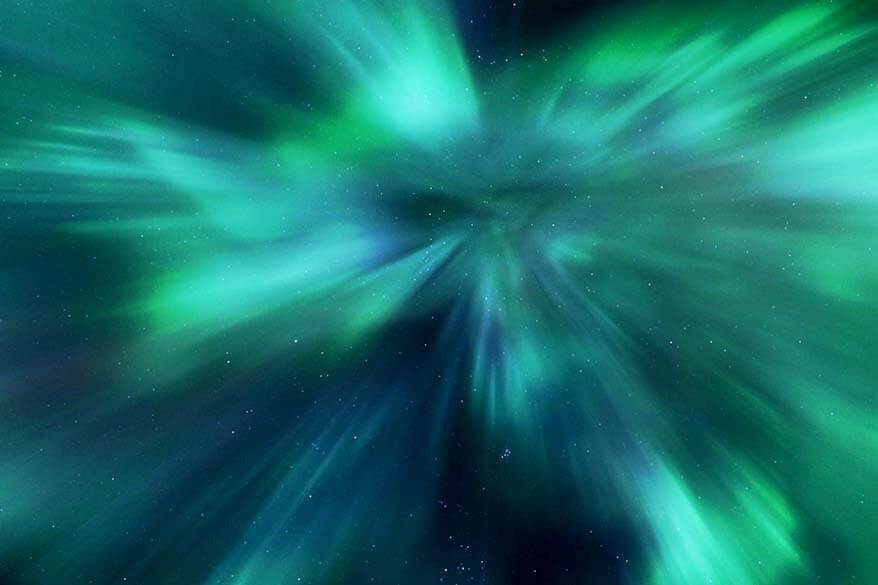
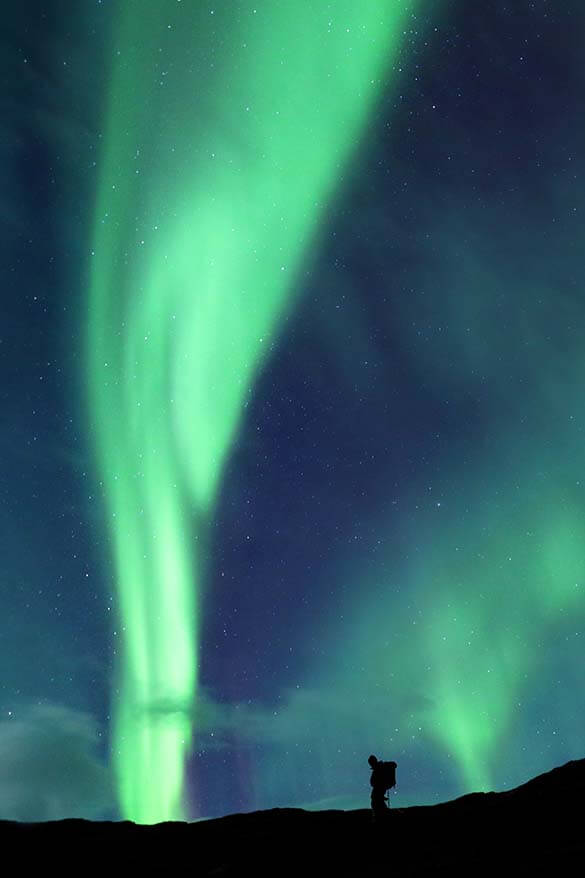
DAY 5: Ice Cave – Jokulsarlon – Fjallsarlon – Skaftafell
We started our day early and made a quick stop at Jokulsarlon Glacial Lagoon at sunrise. We just couldn’t get enough of the scenery here!
This morning is also one of the best moments to do an ice cave tour. This area is THE BEST place in Iceland for natural ice caves. Most tours start right at the Glacier Lagoon.
Good to know: If you want to do this, it’s essential to book an ice cave tour in advance. I recommend choosing the earliest time slot possible.
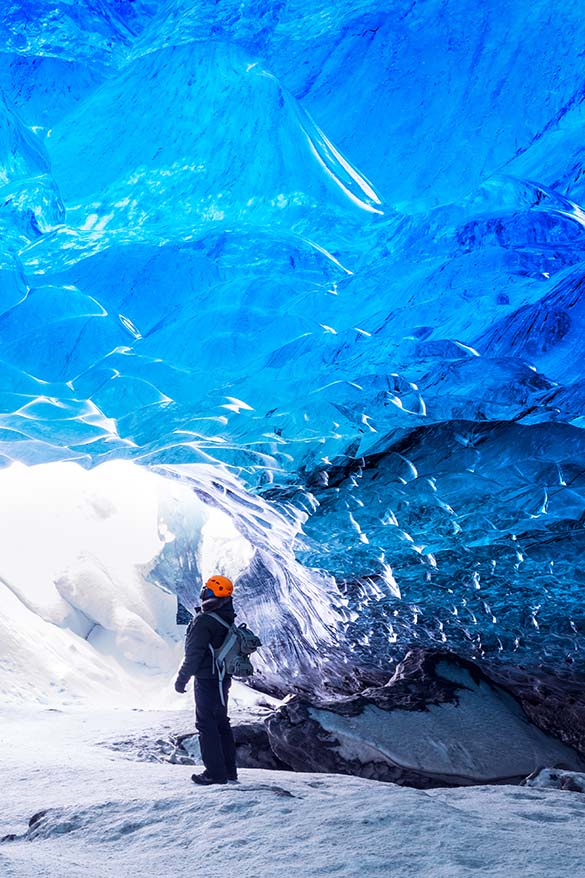
We then continued to the nearby Fjallsarlon Glacier Lagoon, a short drive further. It’s a smaller and (much) less visited glacial lagoon than Jokulsarlon, but it’s also not to be missed!
If you travel here before mid-November, you can do boat tours between the icebergs. Unfortunately, boats don’t run in the winter months (some stop in September, others in October, and some run till mid-November).
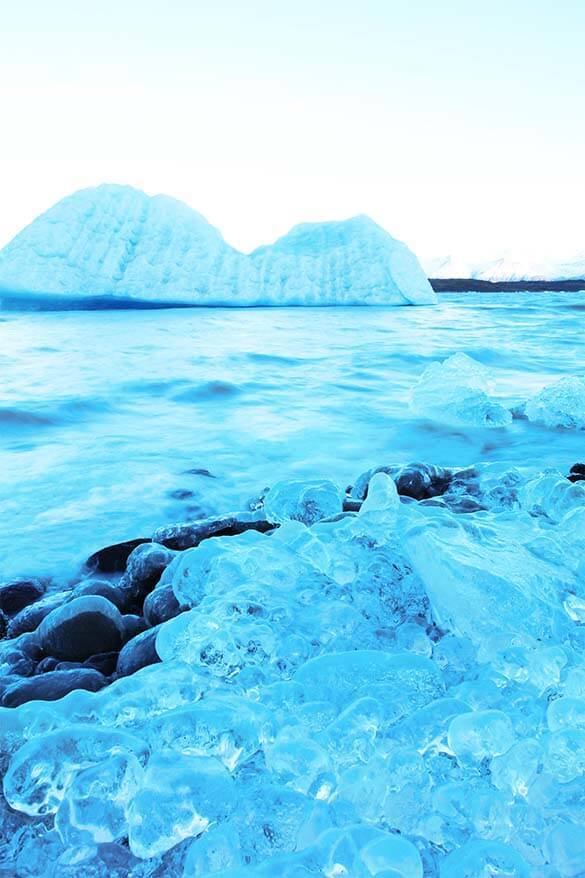
TIP: If you are doing this trip earlier or later in the winter (October or February – April) when the days are longer, you could easily add Stokksnes Headland to this itinerary as well.
It’s located a bit further east of Jokulsarlon Glacier Lagoon, about 75 minutes drive one-way. So going there will add at least 3 extra hours to your day.
Stokksnes is very scenic and many people find it worth a detour. But don’t try to squeeze in too much if you are traveling in the darkest months! Keep in mind that the roads might be icy too.
If you decide to do that, you could drive there first thing in the morning on day 5 or in the afternoon on day 4 of this itinerary.
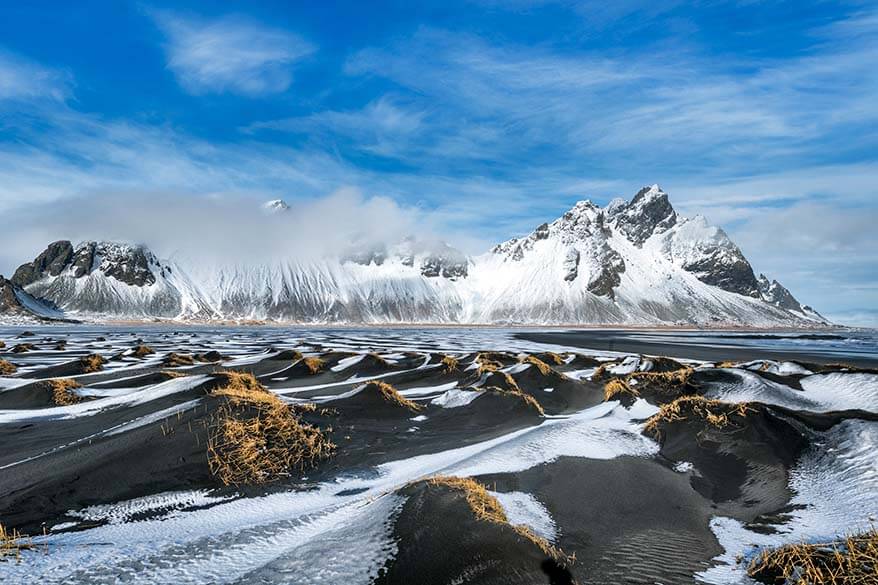
On this trip in November, the days were too short for a detour to Stokksnes.
We continued back west to Skaftafell, part of Vatnajökull National Park. Summer or winter, you should not skip Skaftafell. It’s a beautiful area with lots of hiking trails.
During this Iceland winter trip, we hiked to the famous Svartifoss Waterfall and continued on the Sjónarnípa trail. The views were simply amazing!
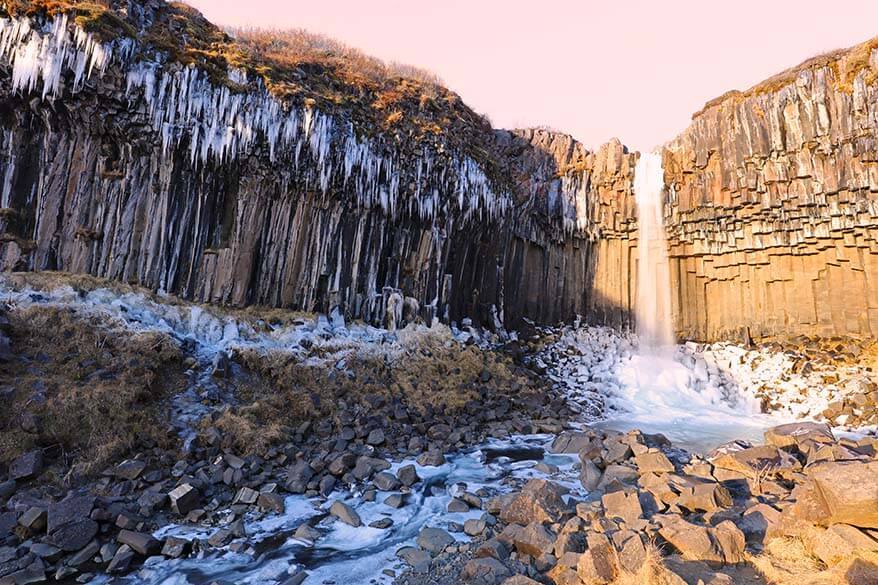
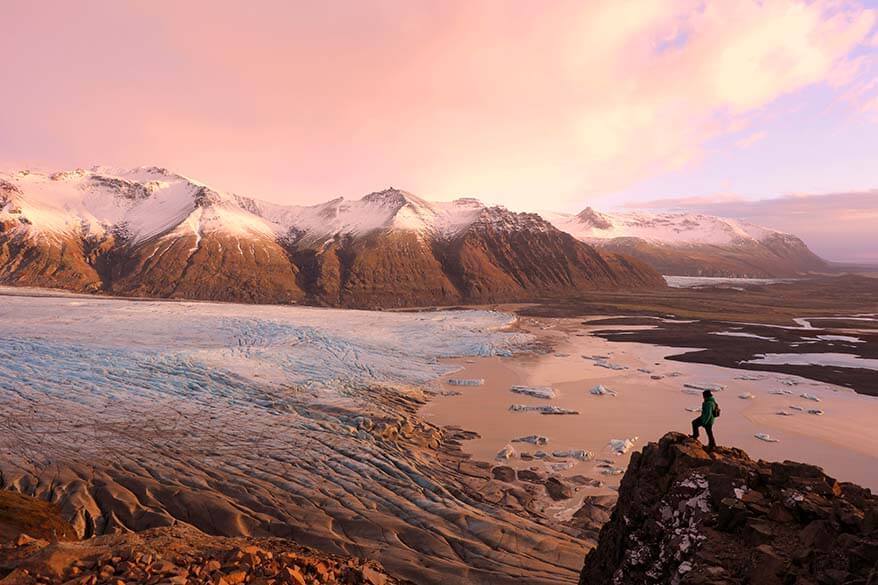
During our previous trip, years ago in summer, we did the Svartifoss – Sjónarsker – Sel walk and the walk to the glacier Skaftafellsjökull.
There are many hiking trails in Skaftafell National Park and quite some of them can be accessible in winter. But it’s best that you ask about current conditions at the visitor center before starting any walk. They will be able to advise you on the best hikes for that specific moment.
The weather is unpredictable in Iceland and even more so in the winter, so what you can do here will depend on the situation at the moment of your visit.
Alternatively, if you want more certainty, book an ice cave tour at Skaftafell. These tours run from October to March – mid April and are one of the best things you can do in Iceland in winter! Because you hike on the glacier and are equipped for walking on ice anyway, it’s a bit more reliable than planning regular hikes.
WHERE TO STAY: We stayed in the Kirkjubaejarklauster area at Hotel Laki – the same hotel as on DAY 3 of this itinerary.
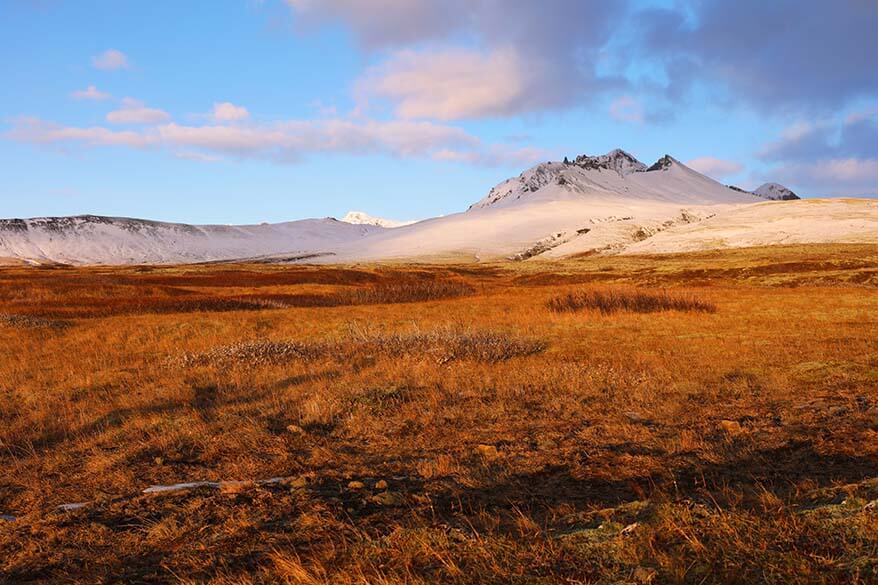
DAY 6: Fjardrargljufur Canyon – Eldhraun Lava Field – Seljalandsfoss Waterfall
We started our day at another iconic landmark of Iceland – Fjardrargljufur Canyon.
Here, you basically walk on the ridge of the canyon enjoying the views below. There are a few viewing areas too which are probably a safer choice if there is snow or ice on the trails.
It was so cold when we were here, that I can’t even try to explain it in words. But we braved the wind and made a short walk at this majestic canyon.
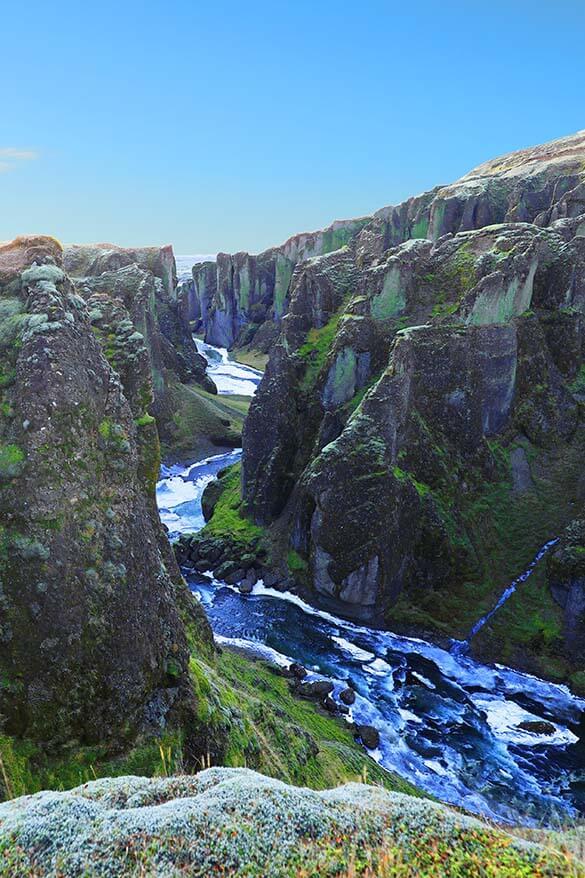
Afterwards, we drove through Iceland’s largest lava field – Eldhraun – and made a short stop to admire this surreal landscape.
Eldgjárhraun, to the east of Mýrdalssandur, is one of the largest lava flows that ever occurred, during a massive volcano eruption in 974.
The dimensions of this lava field are immense – some 700 km2. For comparison, the total area of Singapore is 648 km2.
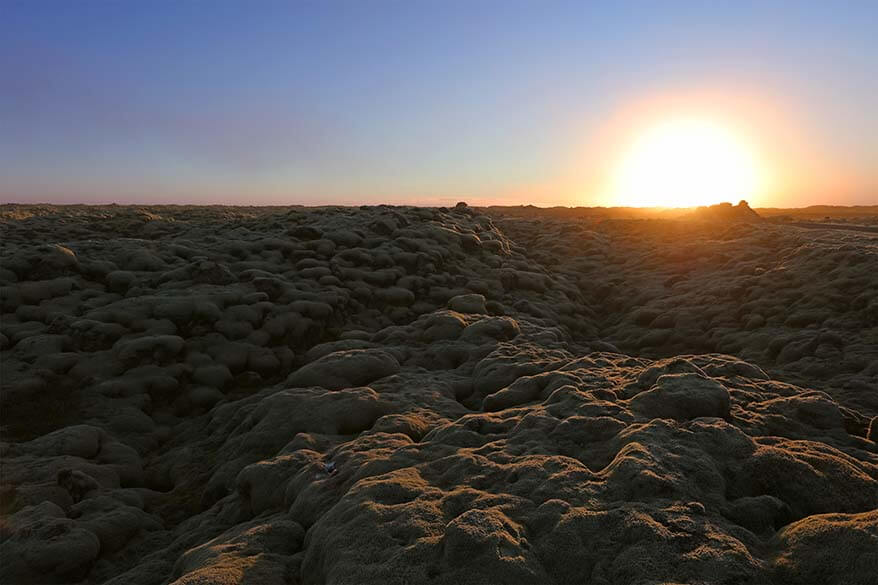
Continuing our journey back in the direction of Reykjavik we visited Dyrhólaeyjarviti Lighthouse and made a coastal walk from there to Kirkjufjara beach below.
If you are short on time or if it’s very cold, you can just drive to the lighthouse and enjoy the coastal scenery and the views from there.
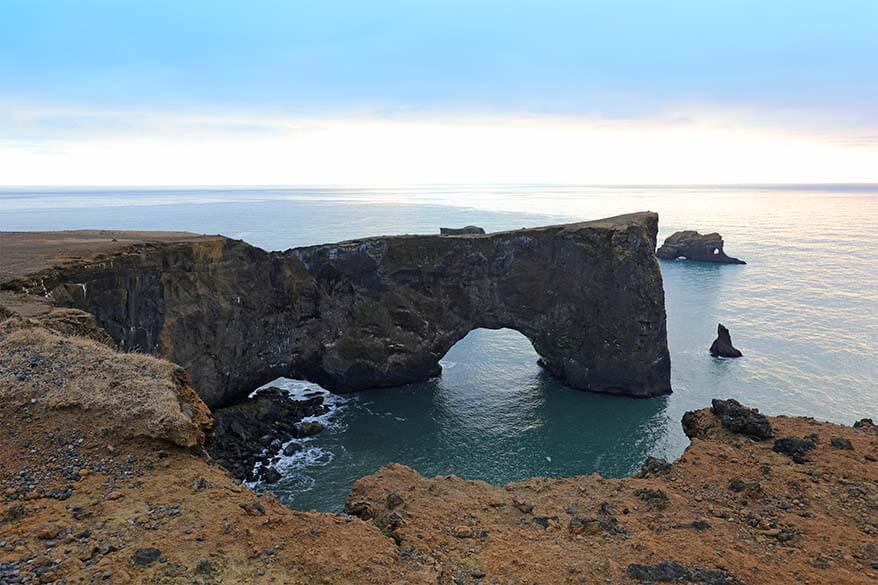
The last stop today was another famous South Coast waterfall – Seljalandsfoss. It had been freezing cold over the last few days and the area close to the waterfall was completely frozen. We could hardly walk or even stand here. This is the reason you should pack ice cleats when visiting Iceland in winter!
Needless to say, the path behind the waterfall was closed, but it was still unbelievably impressive. Maybe even more so because it was frozen in winter.
We ended our day with the last stop of our Iceland winter trip – Reykjavik.
WHERE TO STAY: We stayed at the Fosshotel Reykjavik for 2 nights. For more info and recommended hotels in Reykjavik, please see our detailed guide via the link below.
LEARN MORE: Where to Stay in Reykjavik
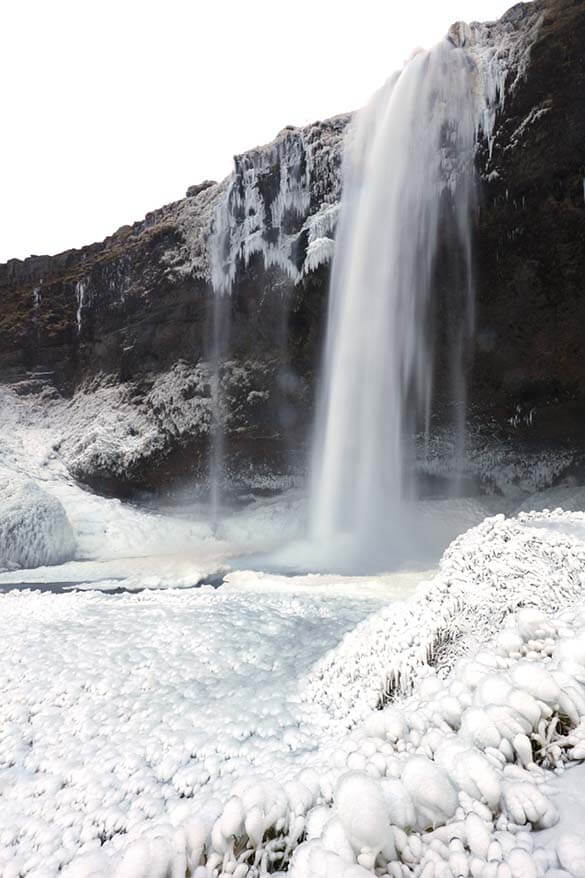
DAY 7: Reykjavik + Blue Lagoon or Sky Lagoon
Now I’m not going to make myself popular with Icelanders I suppose, but in my honest opinion, one day is enough for Reykjavik, especially if you have limited time in Iceland. So on this winter trip, we didn’t spend too much time in the city.
Don’t take me wrong – Reykjavik is well worth visiting. There is a lot to see and do in the city (e.g. Perlan or the Whales of Iceland exhibition, to mention just a few. However, if you are short on time, half day to one day is sufficient for Reykjavik because the real beauty of Iceland is in its natural wonders.
One thing you really shouldn’t miss in Reykjavik is the Hallgrimskirkja. The view from the church tower is really worth it, but also the church itself is really special, so definitely worth seeing.
For this itinerary, I recommend that you spend a big part of the day in Reykjavik and visit one of the geothermal baths in the evening. See below for more info on the two best options.
TIP: Take a look at our Reykjavik 1-day itinerary for a detailed itinerary and our recommendations on what to see and how to plan your time in the city.
READ ALSO: Best Things to Do in Reykjavik
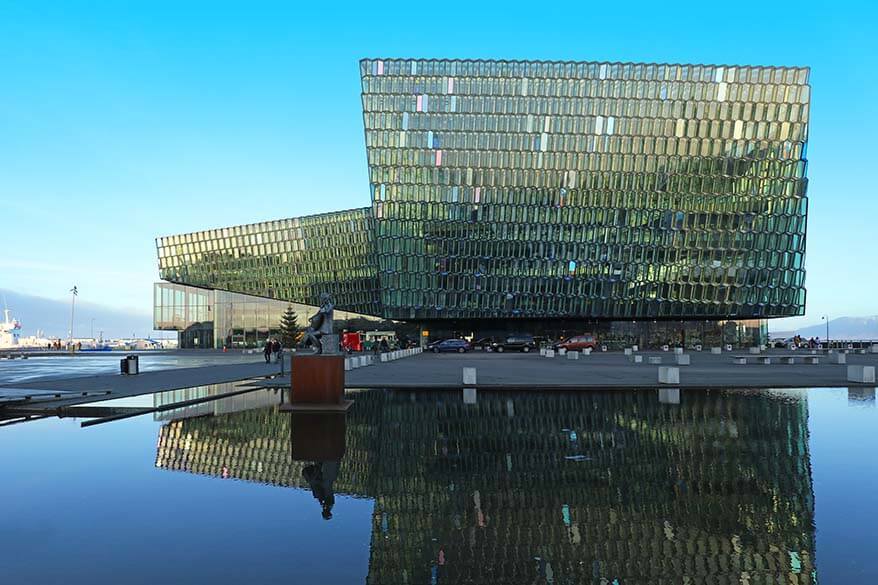
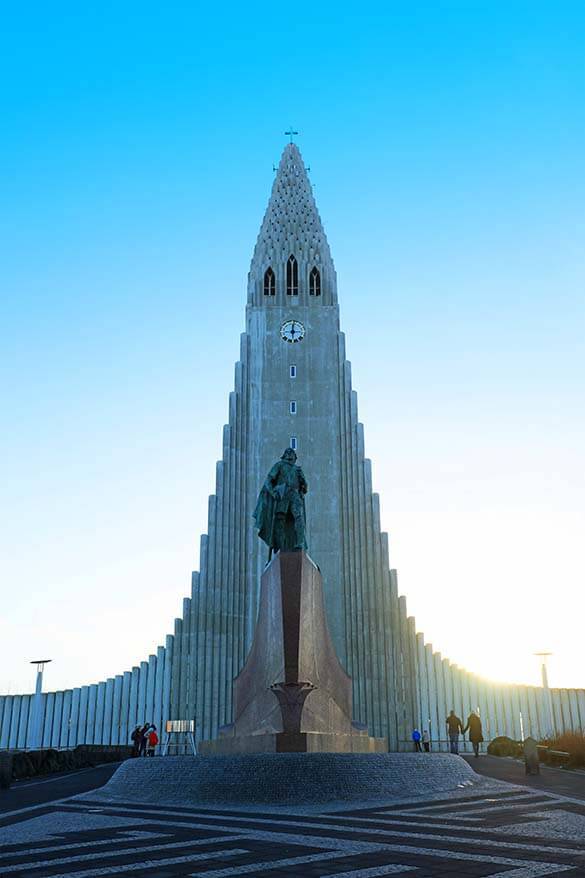
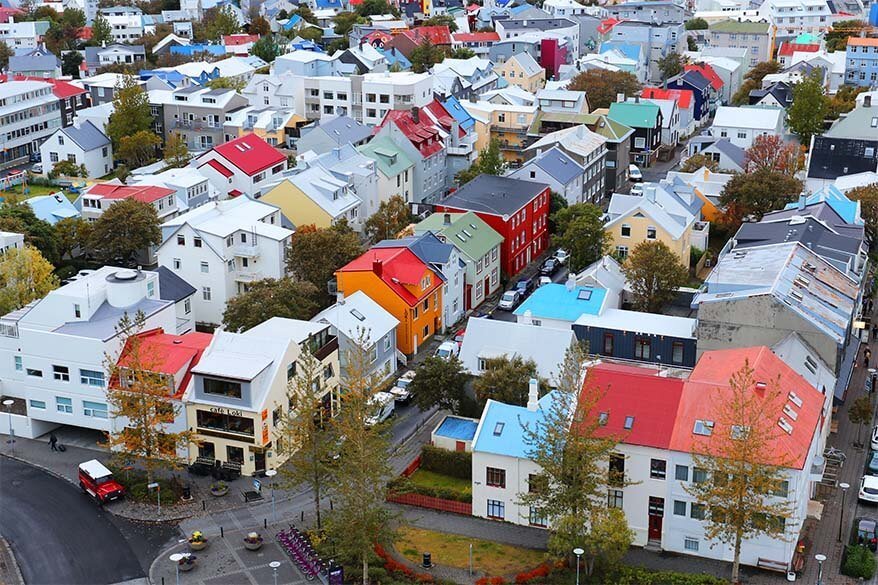
In the evening, visit one of the two best geothermal pools near Reykjavik – either Blue Lagoon or Sky Lagoon.
Blue Lagoon is the best known and is extremely popular and touristy. But it’s popular for a reason. After all, there is no better way to end your Icelandic winter trip than sipping a drink while sitting in a hot thermal pool with a mud mask on your face. And before you ask, no, I don’t have a picture of myself with a mud mask…
Good to know: If you decide to visit the Blue Lagoon, you’ll have to reserve your tickets in advance! Here you can book bus transfers to get there from Reykjavik.
Another really nice geothermal pool is the Sky Lagoon. It’s located at the coast and the views are amazing! Many of our readers say that they much prefer the Sky Lagoon experience over the Blue Lagoon. Sky is also much closer to the city and you don’t have to worry about volcanic activity (due to which Blue Lagoon has been closed quite often).
Good to know: Also here, it’s essential to reserve your tickets in advance. Sky Lagoon is a lot smaller than Blue Lagoon and often sells out as well. You can also opt for a ticket that includes a transfer from the city.
Alternatively, you can also go swimming in one of the local swimming pools in Reykjavik, at a fraction of the cost. But I really recommend visiting one of the geothermal pools at least once – it’s a unique experience!
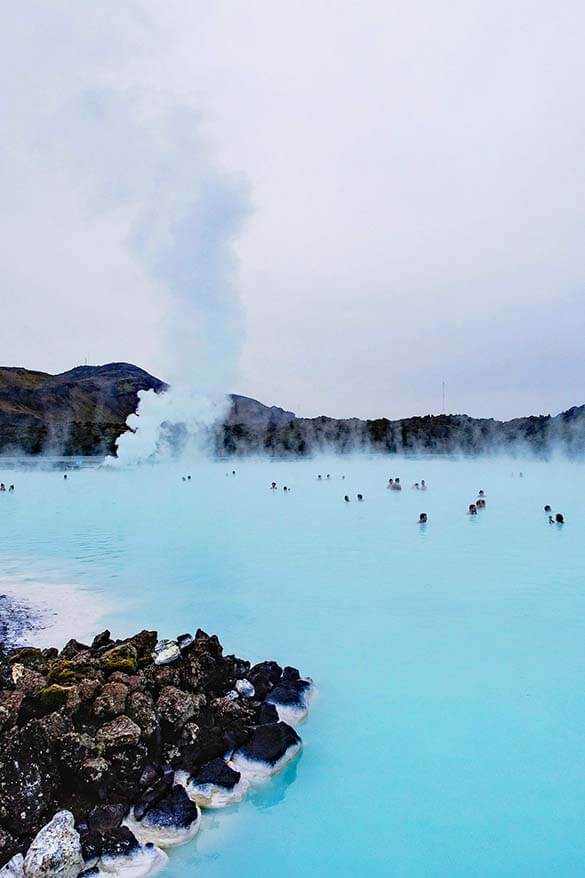
Organized Tours – Iceland Winter Trip Alternative
If you are not keen on driving in Iceland in winter, you have several options: stay in Reykjavik and do day trips, book a multi-day tour, or a combination of the two.
Organized multi-day tours make trip planning a breeze and it’s often cheaper than doing it on your own since they already include all the excursions like ice cave, etc. Not even to mention that it’s much safer if you are not used to driving in extreme winter conditions.
We already mentioned a few options, but here they are once again: a 2-day tour, 3 days, 4-5-6-7 days, and 8 days. You can easily combine these multi-day tours with a few days in Reykjavik at the beginning and/or end of your trip.
Alternatively, stay in Reykjavik all the time and book day trips. This would mean more time spent in the bus every day, but you don’t have to pack/unpack and you keep more flexibility to change your plans depending on the weather. Via the link below, you can find our hand-picked selection of the best winter tours from the city.
LEARN MORE: Best Winter Day Trips & Tours from Reykjavik
Good to know: We recommend booking all your tours through GetYourGuide. Their exceptional customer service and flexible 24-hour free cancellation policy offer peace of mind. After hearing plenty of stories of local providers in Iceland refusing to refund canceled tours, we don’t recommend booking directly.
Helpful Tips
Here are some useful tips for your winter trip to Iceland:
✓ Planning to rent a car and do a self-drive trip in Iceland following this itinerary? Normally, you don’t need a 4WD for this trip, but I highly recommend it. You can find some of the best deals for Iceland car rental here. Make sure that you take full insurance! It’s a must in Iceland in any season, but even more so in the winter. Read also our complete guide to driving in Iceland in winter.
✓ Traveling to Iceland in winter? Don’t forget good travel insurance for yourself as well!
✓ Bring a power bank for your phone and a travel adapter! Iceland uses European plugs.
✓ Bring warm winter boots and ice cleats. Also hand- and feet warmers are nice to have.
✓ Wondering what else to pack for your Iceland winter trip? See the complete Iceland packing list for winter.
For more winter-specific tips, please see our detailed guide via the link below!
LEARN MORE: Iceland Winter Travel Tips
Printable Itinerary
If you are interested in a free printable Iceland winter itinerary, please fill in the form below and we will send you a link to download a .pdf file right away.
So this is our Iceland winter trip itinerary for one week in a nutshell. It brings you to the nicest places on the South Coast of Iceland while leaving plenty of time to explore and even do some winter hiking on the way. In October or March, when there is more daylight, you could probably squeeze in the same Iceland winter road trip itinerary in 4 or 5 days as well, but then you’d have less time left for hiking and sightseeing…
When the days are even longer, you can visit pretty much all the same places in 4 days. For more information, please check our very detailed itinerary for the best of Iceland in 4 days.
If you decide to visit Iceland in the warmer months instead, check out this 7 days Iceland itinerary. It covers all the places mentioned in this article and so much more. Because the days are endless in summer and the road conditions are good, you can see a lot more in the same amount of time. We also have a suggested self-drive Iceland Ring Road itinerary, but we only recommend doing it in summer – early fall.
I hope that this article and our tips help you plan an unforgettable winter trip to Iceland! Don’t miss our other articles that contain many more tips and practical information for your trip. Take a look below!
More tips for your winter trip to Iceland:
- Airport transfers: How to Get to Reykjavik from Keflavik Airport
- Budget: How Expensive is Iceland (& How to Save Money)
- Good to know: Tips for Visiting Iceland
- Itineraries: Iceland Itinerary (for any duration)
- Near Reykjavik: Best Half Day Tours from Reykjavik
- Winter tours: Best Iceland Winter Tours from Reykjavik
- Nice to see: Perlan Museum in Reykjavik
- Aurora photography: How to See and Photograph the Northern Lights
- For more info and destination guides, check out our Iceland travel guide.
TIP: Did you find this guide helpful? Bookmark this post for later, share it with your friends, and save it to Pinterest to inspire your next trip.
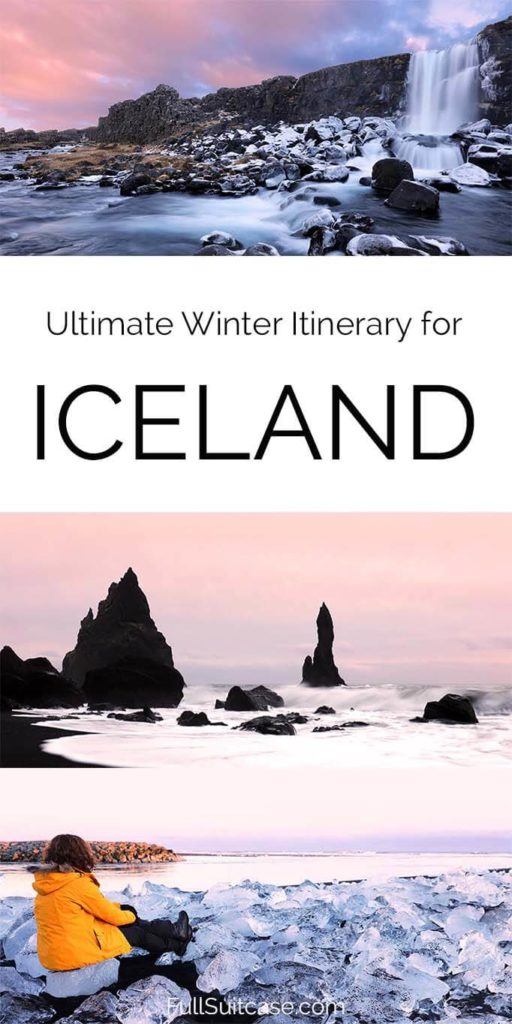
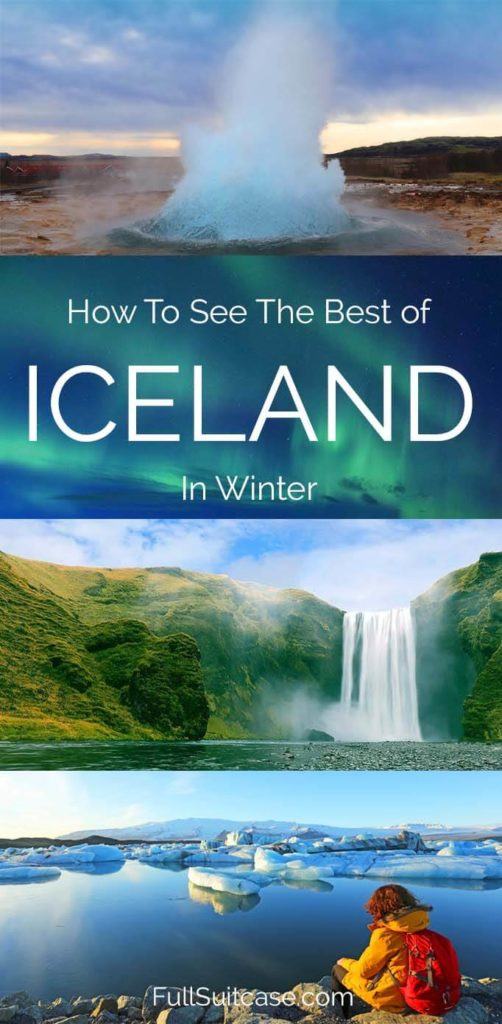

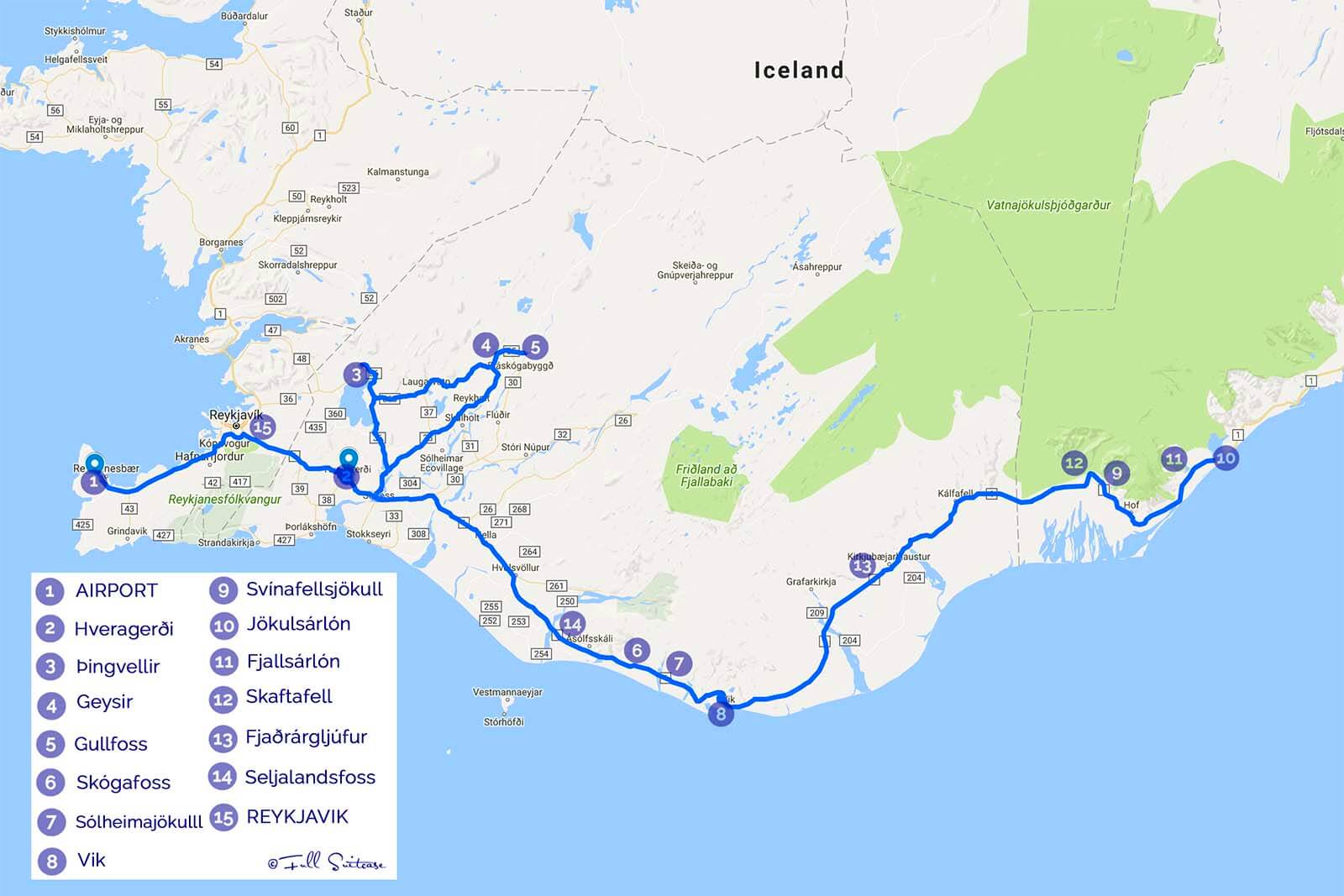
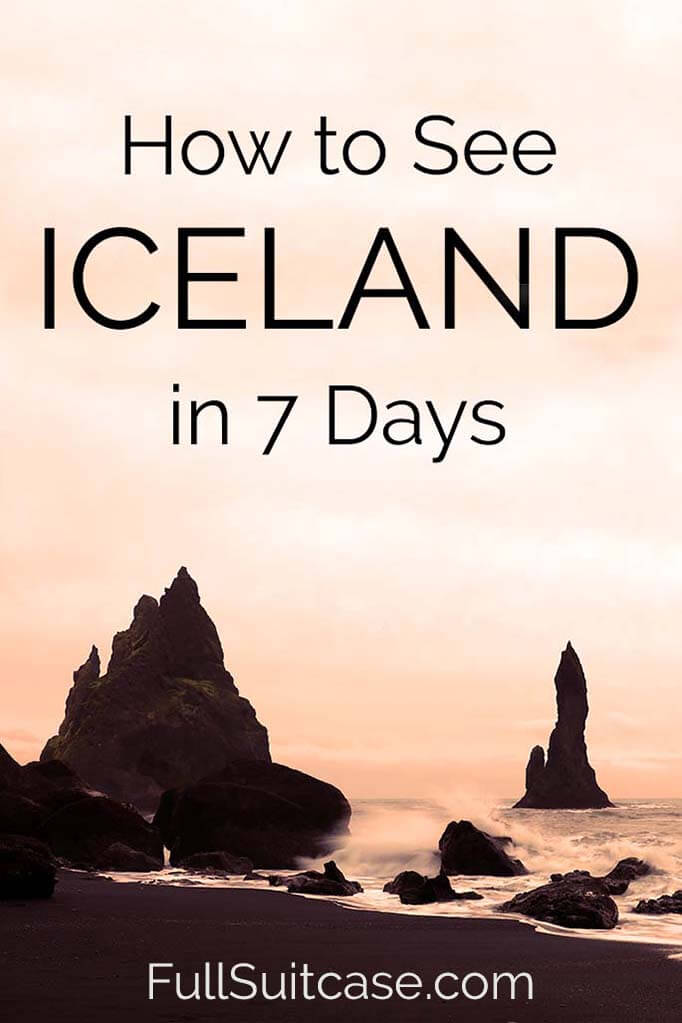
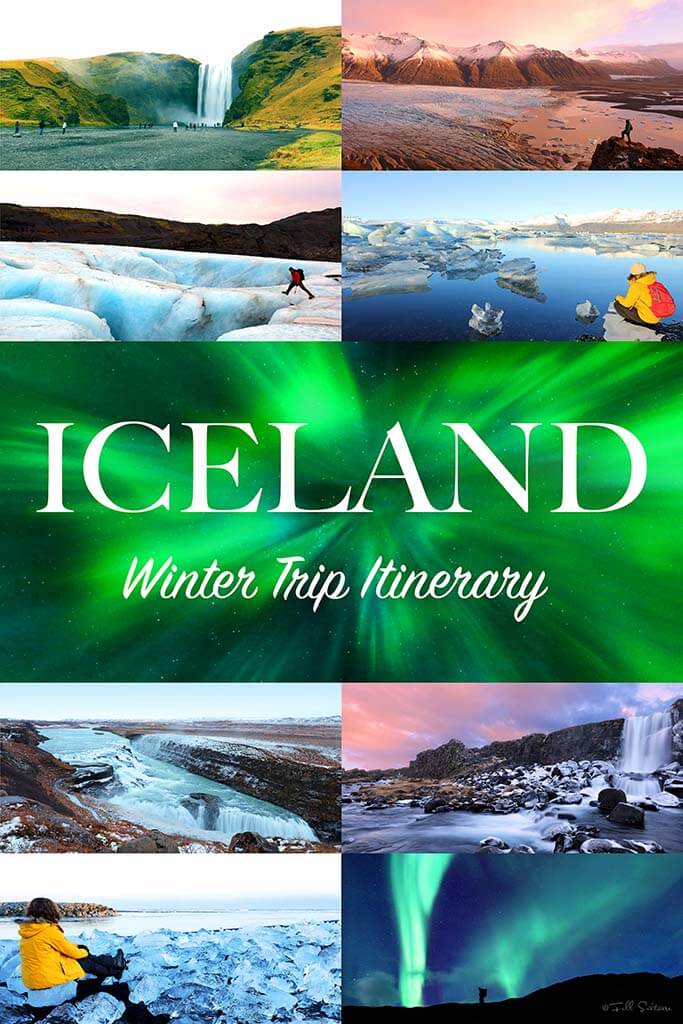

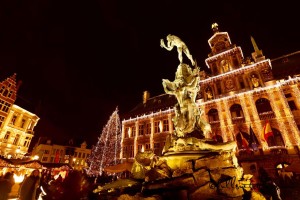
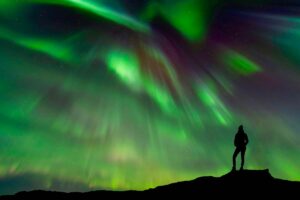
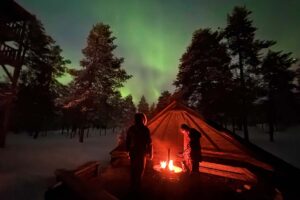
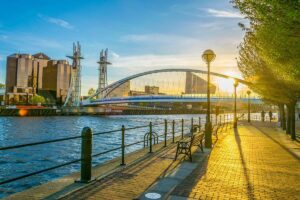
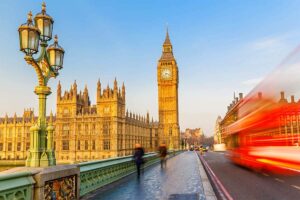
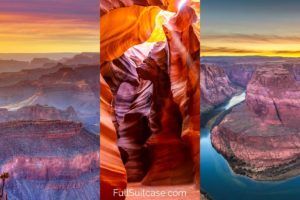
Hi, we are planning to do a road trip from 31 March to 9 April. Do you think it is okay to self-drive? We are looking to follow your trip from this itinerary “Complete Iceland Ring Road Itinerary”. Please kindly advise 🙂
Many thanks!
Hi Jay, I can’t really answer this question. It depends on how confident are you in driving in potentially hazardous winter conditions. Please see our guide to ‘driving in Iceland in winter‘ for more info. If you have never driven in a snowstorm before, Iceland is really not the place you want to try it. Early April can still be quite wintery, especially in northern Iceland, and weather conditions are notoriously unpredictable. You might experience beautiful weather and clear roads, but it can also change rapidly, so it’s impossible to know for sure until you’re there. It can turn out just great, but there is no way to know in advance.
A good thing at that time of the year is that the days are much longer already, so you have a lot more hours of daylight to visit the main highlights along the Ring Road. Keep in mind that hiking and some other outdoor activities might not be possible, so I would still primarily focus on winter activities (glacier tours, snowmobiling, and also geothermal pools, of course). That said, I see that e.g. whale watching tours in Husavik are bookable from April 1, so if you are lucky with the weather, you could already do quite a lot at that time of the year. In any case, not everything that is described in our Ring Road itinerary.
Ultimately, it’s up to you to decide whether you’re comfortable taking the risk. If you choose to drive the entire Ring Road, I recommend keeping a close eye on the weather and road conditions and building flexibility into your plans in case you need to adjust your itinerary. You will also need to research every place you want to visit as many will not be open or accessible yet.
@Jurga, many thanks for your great advice! It was very thorough and really helpful 🙂
hi , if I were to follow exactly of this 7 days road trip in March will it still be ok to self drive ? THANKS
Hi Jessey, March is still winter in Iceland so you never know in advance how the weather or the road conditions will be. It can be dry and beautiful or you can get caught in a snowstorm… So only do a self-drive trip if you have winter driving experience and understand that conditions can change at any time.
Otherwise, stay in Reykjavik and book day tours or consider a multi-day trip with a local guide/driver, as already explained in the article above.
Have a great trip!
Hi there,
I’ve been dreaming of going to Iceland for 10 years! We’re finally able to go this year. I love you article on where to visit. Can you please help me where to stay for and how long I should book for each attraction? That’s where I have a hard time planning.
Thank you so much!
Tam Harrell
Hi Tam, all this info is already in the article including the hotels that fit this itinerary.
Since it looks like you are planning on traveling in the winter, I strongly encourage you to read the following guides as well: Iceland winter travel tips and driving in Iceland in winter.
If you would decide to stay in Reykjavik and make day tours, please see the following guides as well: Where to stay in Reykjavik and Best winter tours from Reykjavik.
Hope this helps.
Hi…were the northern lights visible from Jokulsarlon area where you stayed or did you have to book a separate tour for the same. We are a family of 4 planning to visits in Dec.
Hi, if the Northern Lights show up and it’s not cloudy, you can see them anywhere. So if you are doing a road trip and are staying in rural areas, keep an eye on the aurora forecast every night and you always have a chance to see them. We only recommend taking tours if you are staying in the city (because of the light pollution, weaker auroras are often not visible in town but might be visible in the darker places). You can find more information in our guide to the Northern Lights in Iceland.
Have a great trip!
@Jurga, Thnx. Your blog has made it super easy for us to plan our trip.
We’re going for 7 days at end of sept to 1st week Oct. I feel like we’re between your 2 itineraries. Should we still go to the. Snell… peninsula ? I noticed it’s not on the winter itinerary. Thanks.
Hi Kathy, the first week of October is doable for the summer itinerary. Just to make it clear – you can also visit Snaefellsnes Peninsula in winter, but the roads can be more dangerous and there is more chance for very strong winds. The main reason it’s not in the winter itinerary is that the number of daylight hours is really limited and there is only that much that you can fit in a day (or a week).
In October, the weather shouldn’t be too wintery yet and you still have about 12 hours of daylight in the first week of October (more or less between 7 am and 7pm). So if you start your days early and plan well, you can see a lot. Our ‘summer’ itinerary should work timing wise, I’m just not sure if Heimaey Island would be worth it at that time of the year (and the Highlands are not an option). So you could spend an extra day on the south coast or somewhere else depending on your preferences.
Enjoy your trip!
@Jurga, thank you so much. I have really enjoyed your blog and information. I suppose the highlands are not an option due to weather? Same with Ahriman island?
I had to google to see which island you mean. Never heard it called like that before :). You can visit Heimaey Island the whole year, but it’s much nicer in the summer when there are puffins around. The roads in the Highlands are usually already inaccessible at this time of the year. But there are plenty of other nice options. Take a look at our South Coast guide for some inspiration.
@Kathy, yes, sorry. That was due to stupid autocorrect!
@Jurga,
Which do you consider your summer iteneary? The full island in 10 days? We are headed to Iceland the first week of October. We are early risers and are from Canada’s north so are comfortable with winter driving conditions. If we can add a little more than what you’ve outline here, we will.
Thank you for the amazing blog – so helpful!
Hi Sarah, this is the 7-day itinerary that we recommend in the summer. In the beginning of October the days are somewhat longer still and you could definitely do a bit more than what is described in our winter guide.
One option would be to add Snaefellsnes Peninsula at the beginning of the trip as described in the summer itinerary. Another option would be to look for additional activities along the coast – see our South Coast guide for some ideas.
Have a great trip!
Do you have any suggestions for adding in some time at the snfellsnes peninsula?
Hi JoAnna, yes, absolutely. Please see our travel guide to Snaefellsnes Peninsula and also the best things to do in Snaefellsnes Peninsula.
Just keep in mind that not everything will be just as easily accessible in winter as in the summer.
Hope this helps.
Thinking of a 7 day itinerary for Iceland next spring break (2024) with kids. March 29- April 5-6. Should I follow the winter guide? Will driving conditions be okay during that time?
Thanks
Hi Carrie, the days are much longer at that time of the year, so you could do a lot more than what this winter itinerary covers. So yes, you could do the summer one, with some seasonal adjustments (e.g. you could do an ice cave tour if your kids are older than 8 years).
As for the driving conditions, there is no way to know in advance. It’s not very likely to get a snowstorm, but it’s possible. It can still be quite wintery at that time. There is really no way anyone can tell you now how the weather will be. There is just one big advantage – there is more daylight so you shouldn’t have to drive in the dark if you start your days early.
@Jurga, great thank you! This is very helpful!
Jurga,
I just want to thank you so much for this blog post. I looked at various bloggers, guidebooks, etc. to plan our 7 days in Iceland this February. By far, you did the most succinct job of making a simple itinerary. I APPREICATE the map so much as well. Thanks for sharing your insights, links and tips with the world.
Thank you so much for your kind feedback, Michelle. Glad to help and have a wonderful time in Iceland!
Just got back last night. We followed all of your advice for the 7day self drive option. We had an amazing time. Driving there was easy, we had no problem with food and thought the meals were delicious . We also lucked out with the weather and only had wind the last two days, other days were sunny. We also saw the northern lights, rode the horses at eldhestar, saw all of the waterfalls and walked the glacier and snow caves on the the jokilsarlon glacier. We liked all the hotels
We Stayed at including eldhestar , magma, foss glacier and laki. Thank you for putting this together so clearly! We would never have been able to see everything without this guide!
Glad to hear you had such an amazing time in Iceland, Kathleen. Happy to help!
As for driving and the Northern Lights, it sounds like you really lucked out with the weather. That makes a huge difference indeed.
Happy travels!
Thanks for the helpful post
Glad to help, Steve. Have a great time in Iceland!
This was such a helpful post – thank you. I am looking to go to Iceland in December, however my partner is not much of a hiker. What are your top two favorite must see hikes along this path in the winter?
Hi Alex, there’s not much hiking in this itinerary at all (most places are just next to the car parking, and you walk for maybe 5-10 minutes, maybe 15-20 min here or there if you take your time). It’s a big question mark how much hiking you can do in Iceland in December. There are just 3-4 hours of daylight and the hiking trails will likely be muddy and wet, if not covered by snow.
If you do one ‘longer’ hike, consider hiking to Svartifoss waterfall at Skaftafell (see day 5 of this itinerary). That should be ok in December, but do ask at the visitor center on the day itself how the trails are. Another option is a glacier hike, as described on day 3 – for that, you’ll need to go with a guide, but that’s definitely possible in winter too. That’s really all the hiking you can even consider at that time of the year.
Hope this helps.
Hi Jurga, thank you for the above itinerary! It is extremely useful!!
I wanted to ask – I plan on going to Iceland in early March of this year and I note that this is still winter season. With the expected sunset being about 7pm, is the above winter itinerary still the best to use? Or would the other 7 day plan be better?
Also do you know what is the best way to see the northern lights? Are there certain areas that are better for viewing that you could do on your own or would booking a tour be best?
Thanks again,
Holly.
Hi Holly, if you are traveling in early March, I think I’d stick to this itinerary. Unless you are really a very confident driver in – potentially – extreme winter conditions. You just never know how the roads will be and it’s good to have some extra daylight time and not have to rush through all these places. We did lots of driving in the dark and sightseeing time was sometimes limited, so with a few extra hours of daylight, you’ll just have a more relaxing experience.
I wouldn’t necessarily add more places to the itinerary, but simply take more time to explore the areas that we mention without always having to rush.
You could try to plan a bit more time at the Jokulsarlon area and book one of the natural ice cave tours there (potentially instead of the glacier hike) – I recommend this tour.
And/or, you can book a snowmobile tour at the Golden Circle if you have a few hours extra (this is a nice tour, and this one also visits a (man-made) ice cave).
A lot also depends on how much time you have exactly (flight times, how many full days, etc.).
If you have a full extra day, you could potentially also add Snaefellsnes Peninsula to your itinerary (can be visited with a day tour from Reykjavik too). But otherwise, just leave it for the next visit (you’ll want to go back anyway ;)).
Hope this helps. Good luck with the planning!
@Jurga, Thank you so much for taking the time to reply, this is so helpful! Will definitely be following your advice here!
One more query if you don’t mind – are there certain areas during the above winter itinerary that are best for viewing the northern lights?
Thanks again,
Holly.
Oh, sorry, I overlooked that question. No, there is no specific area and everywhere is good if the conditions are right. You can read more about auroras in Iceland here. When you make a road trip, choose hotels that are somewhat in the darker areas (the hotels we stayed at were all ok for that), and simply go out every time when the forecast looks favorable. There are even some apps that can warn you when the chances are good. But it’s really a matter of luck with the weather. If there are no clouds, you always have a chance, even if the activity is only 2-3.
@Jurga, thank you so much (again), Jurga! This has been so helpful – really appreciate you taking the time to answer my questions!
Holly.
This was the by far the best breakdown I’ve seen. Thank you for all your hard work and beautiful photos! So excited to be going here. I didn’t see it in the post but what was the cost of the 7 days with a rental car, hotels, food, tours etc?
Hi Laura, glad to hear that you found this useful. For the costs, it’s always hard to say because so much depends on your choices of accommodations, activities, the car, and also how many people share the room and the car.
In general, if you travel with 2 people, you should count about 1500-2000 USD per person for a week for a rather comfortable trip with mid-range hotels, dinners, and a few tours (glacier hiking, Blue Lagoon). Once again, if you travel in low season, you can sometimes find better deals for car rental and hotels, so it’s possible to do it cheaper too. On the other hand, you do need a 4×4 in Iceland in winter and rental cars have been really expensive this year so that might add to the cost…
We have a very detailed article where you can find more details about how much everything costs in Iceland. Check it out.
@Jurga, Thank you so much! I really appreciate your time to reply.
Hi Jurga,
Our trip is quickly approaching and I’m working on a detailed itinerary based off of yours. Can you tell me if the Vatnajokull glacier ice caving and glacier hiking is the same as the Skaftafell ice caving and glacier hike? Or if they’d be similar enough to just do 1? We are visiting 23rd Oct-30th Oct. Thanks! Ann
Hi Ann, Vatnajokull glacier is a huge glacier (the big white spot on the map of Iceland). It has many tongues, so sometimes you see the name of the main glacier and sometimes the names of the glacier tongues.
If you are comparing specific tours, just take a look at their departure location and you’ll quickly get an idea if they are visiting the same place. Most often, indeed, the glacier around Skaftafell – Jokulsarlon is also referred to as the Vatnajokull glacier, but sometimes they use the names of the departure area instead. Quite often, they’ll say Skaftafell for tours that depart near Skaftafell visitors center and Vatnajokull for tours that depart from Jokulsarlon. The two places are close to each other, but where exactly each tour goes, depends on their local guides and the locations they scout out for that season.
In our guide to glacier hiking in Iceland, you can find an overview of the most popular locations for glacier hiking tours along the south coast.
If you are looking to visit an ice cave, I hear that the ones closer to Jokulsarlon are the nicest (but it remains a natural phenomenon and you can’t really know in advance which caves you visit or how they’ll look like this winter). This is one of the best-rated ice caving tours that start from Jokulsarlon and here you can find all the available options.
Hope this helps.
Have a wonderful trip!
Can you post where you stayed for each of these day trips or did you stay in one place Asa base and do day trips?
Hi Kate, if you read the article in detail, you’ll find all this information in there – with the exact name of each hotel we stayed at and all the places we visited, exactly as we did it.
However, if you don’t have serious winter driving experience, it’s best to either book a multi-day tour with a local guide or stay in Reykjavik and do organized day trips from there. We have all these suggestions in the article above as well.
Hope this helps!
Hi! Thank you so much for the detailed and amazing itinerary! If you don’t mind me asking, approximately how much did you spend on this trip?
And on average, how much did you spend per day for food?
We are planning to visit Iceland between the 17th-22nd of December this year.
@Zach, will you be renting a car and self-driving or booking a 4 day guided tour? I just want to get an idea of what tourists usually do visiting in December and if it’s safe to self-drive.
Hi Afshan, the chances of Zach seeing your question and replying aren’t high, so I’ll chime in. If you do not have extensive winter driving experience, do yourself a favor and do not book a self-drive trip in Iceland in winter! The days are short, the weather is unpredictable, snowstorms are common, and the roads can get closed without any advance notice. In winter, it’s really best to book a multi-day tour with a local driver/guide or stay in Reykjavik and book day tours.
Of course, you may get lucky with the weather and have a good experience, but you can’t count on it.
Here you can read more about driving in Iceland in winter and here you can find our suggested winter tours from Reykjavik.
Hi Zach, it’s really impossible to give someone an estimate of the trip costs. It all depends so much on the accommodations you choose, the car you rent (and/or tours you take), how many people share the room and the car, where you eat, etc.
We have an article that gives you a good idea of how much everything costs in Iceland. In general (a very rough estimate), you should count about 1500 USD per person per week, but some people might be able to do it for less, while others will spend 3000 and more…
As for your travel dates, please be careful if planning to drive in Iceland in winter! There’s hardly 3-4 hours of daylight during the time when you are going and winner storms are common too. We highly recommend staying in Reykjavik city and doing some tours with local guides rather than driving.
Great information! I am helping to plan a company retreat for a week and was wondering what your thoughts were for a group of about 12 people. I was thinking it wisest for them to use Reykjavik as a base and do activities/day trips nearby. Would love any advice for this, will need a hotel or big house to rent for them as well. This would be in October of this year. Thank you!
Hi Jules, there are so many ways to spend a week in Iceland. You could look for a group tour, rent two bigger vehicles and plan a road trip, or indeed, stay in Reykjavik and do day trips. The latter has several advantages in your case – easier to find a good accommodation, no need to worry about car rental or driving conditions, plenty of restaurants and activities in town, and you can easily book day trips to see many amazing places nearby.
For the latter, please see our guide to the best winter day tours from Reykjavik.
For accommodation, check out this guide: where to stay in Reykjavik.
Hope this helps.
Hi,
Thanks for sharing this information! Just a quick question. We are arriving late afternoon and are staying 1 additional night. Where to you think extra time would be best spent? We would be arriving on October 21st.
Thanks!
Ann
Hi Ann,
You could potentially add a day in Reykjavik or Reykjanes Peninsula at the end of your trip. It’s always better to end close to the airport in case of bad weather or road closures or so. Depending on when your flight back is, you could stay close to the airport or in the city.
We are planning a 12 day trip in Iceland the last week of Nov/ first week of Dec. we are planning to rent a 4wd and do Ring Road. Is this a feasible plan? We can drive but Im not looking to die. Thanks!
Hi Kelli, if the weather cooperates, it is possible to drive the entire Ring Road in winter and 12 days is about the right time to attempt this. But you never know how it will be until you are there. Road closures are very common in the Eastern Fjords and in Northern Iceland and they can happen without any prior notice. So you have to be very flexible (not easy when planning a road trip and booking accommodations in many different locations).
Also, the weather is really unpredictable and the days are very short at that time of the year (3-5 hours of daylight depending on the exact dates and where you are). So in order to see something, you will have to drive in the dark a lot as well. Lots of time spent in the dark and driving and not much sightseeing.
I think you’d enjoy your winter trip more if you just concentrate on the South Coast as described in this itinerary and potentially Snaefellsnes Peninsula. You can still experience road closures, but it’s much less common. Also the distances are smaller, so it’s easier to plan your trip with some flexibility in mind.
I know people who did the Ring Road in the heart of the winter and had no problems and I know many examples of people who had to change their travel plans because of the weather. If you haven’t read it yet, please see our guide to driving in Iceland in winter. It should give you a better idea of how difficult it is to predict anything. And make sure you rent a 4WD at that time of the year.
Hope this helps.
Hi, just wanted to give a long overdue thanks for sharing this itinerary. We went to Iceland in late-winter a year ago and used this as our rough outline for the trip and it worked out wonderfully.
Thank you for taking the time to come back to our site and leave this feedback, Andrew. I really appreciate it and I’m also very happy to hear that you enjoyed your trip!
Hope you find more inspiration and practical info for your future trips on our site – check out our destinations page for some inspiration!
Hi,
This article is amazing! We are going to Iceland on 25th Feb for one week and we are super excited – especially as our whole itinerary is planned out – thanks to you!
We are renting a car but I am just wondering if you have a recommendation on when to do the following activities (to fit into your itinerary as we are copying it) and with which tour company (are any cheaper than the other?)
– Snowmobiling
– Whale watching
– Glacier hike – this has to be guided doesn’t it?
Also, re. Northern Lights – you don’t have to do that with a group right? I mean, we can just drive around and see them (as we will be in secluded areas anyway)?
Thanks!
Hi Nafeesa, I have very little time now, so just a quick answer.
Snowmobiling is best done in the Gullfoss area (Golden Circle). You can book a tour that starts at Gullfoss.
Whale watching – I’d not do this in winter. It’s not a good time to see whales and it’s really cold on the boat. There are better things to do in winter in Iceland than this.
Glacier hike – yes, it has to be guided. I have links in the article for tours that you can do and here you can find more info: glacier hiking in Iceland.
Auroras – you can see them anywhere. I usually just go outside at the hotel if the forecast is favorable. Use this site to check the forecast – not much longer than a day in advance. There are also apps.
Enjoy your trip!
Thank you so much!!
Hello Jurga,
Your blog and this itinerary is really helping me plan my upcoming iceland trip. So thanks a lot! I had a question though, since we are going to be driving around everyday I would like to know the number of hours and km/miles we will be on the road each day. This would be very helpful in planning our trip. Also, would you recommend visiting Akureyri- flying in and out from Reykyavik in a day or staying overnight in Akureyri and visiting Lake myvatn. We will be travelling to iceland in Novemeber 2020. Thanks a lot!
Thanks a lot!
Hi Jaini, you can use Google Maps to calculate the exact driving times between destinations. Just keep in mind that a lot will depend on the weather, how the roads are, and also on how much time you spend at each place. Keep in mind that driving in Iceland in winter is really not for everyone too!
As for Akureyri, yes, sure you can fly there from Reykjavik domestic airport and there are day tours from there to Myvatn. This tour from Akureyri seems to be running the whole year, also in November.
Whether it’s worth flying to Akureyri just for that, it’s really your decision. I think that the better use of your time and money would be to visit Snaefellsnes Peninsula or Reykjanes Peninsula – both relatively close to Reykjavik and don’t take that much time and definitely cost less. You can visit on your own or with a guided tour. Going to Akureyri would probably mean that you have to stay 2 nights there in order to have a full day for the Myvatn tour.
Hope this helps. Enjoy your trip!
Hi, Jurga! Thank you for such a well-crafted website that describes multi-day itineraries for those who love to get the most out of their travels without rushing about frenetically! I had drafted a 7-day trip around the Ring Road when reality set in – weather, traffic, new lodgings each night, shorter days … Fortunately, I discovered your 7 – day winter itinerary and have “tweaked it” slightly for a September visit. My wife and I are anticipating our trip with excitement! We also look forward to reading about more of your adventures!
Hi Barry, glad you found this useful. September is a very nice time to visit Iceland (more info in this article – Iceland in September). The days are long enough to do a lot, the roads are generally ok and open, and there are fewer tourists. You also have good chances to see the Northern Lights. There is really nothing to worry about. It’s incomparable to traveling to Iceland in winter… The chances of you getting snow in Iceland in September are very low. It happens, but very rarely and usually only in the highlands.
As for this itinerary, if you have 7 days in September, you can do much more than this because you have more daylight. You’ll love Iceland!
Hi,
Can you please tell me if you did a nothern lights tour or did you come across them on your own. If so, where was the location? Was it on diamond beach?
Hi Matt, most of the times I saw the Northern Lights was just by going outside wherever we stayed at and waiting. You need favorable conditions (dark place, higher aurora activity, and no clouds), but if they are active and the sky is clear, you can see from anywhere.
I never visited Diamond Beach at night, but if you are staying nearby, it might be a good place to go aurora hunting.
If you are staying in the city where there is lots of light pollution, then it’s better to take an organized tour – they really do their best to find the best places with optimal conditions for that specific night. It’s possible that it’s cloudy in Reykjavik but the sky is clear 50km further, so they’ll go there…
Hi! This looks amazing!! My husband and I are traveling to Iceland for our anniversary/40th birthday in mid November in just a few weeks! We’re so excited. We only have 5 days (4 nights.) Any recommendations for a shorter winter version of this trip? We’d be so appreciative!
Hi Meredith, I have a very detailed 4-day Iceland itinerary that covers pretty much the same places. In there, you can find more details which places are ‘must-see’ if you are short on time and how to plan our time.
Enjoy your trip!
Hello Jurga. Just find your blog and i am love with it. I want to organise a trip to Iceland on Winter with my wife and this blog is the best start i could imagine. You said that you did this trip on mid November. If we do this trip on mid February is any different (weather, road conditions, daylight hours, iconic landmark)? we didn’t book any tickets so we may have more days in our itinerary if we want. Are Borgarnes, Reykholt, Glymur Waterfall, Silfra Diving, Langjokull Glacier, Kerid Crater, Skálholt, Haifoss, Thórsmörk, Mýrdalsjökull, Seljavallalaug Swimming Pool, Heimaey island, Eyjafjallajökull, Ingólfshöfði Puffin Tour or Vestrahorn Beach available without risk in Winter? Is any of these worth it? We are not experiended winter drivers either. Thank you in advance.
Hi George, sorry for the late reply. Yes, you can use this itinerary for February and it will be similar to November in terms of daylight hours and driving conditions.
You can do quite some things that you mentioned in winter as well, but you have to plan it well. You can check our 4-day Iceland itinerary for more details of places to visit along the South Coast – Kerid crater, silfra snorkeling are all in there. Some others, like Haifoss waterfall or Thorsmork aren’t accessible in winter and puffins aren’t there in winter either. Anything in the highlands isn’t accessible and places like Heimaey island might not be ideal to visit in February (depends on the weather I suppose). Langjokull glacier is possible to visit with a tour. Borgarnes in itself isn’t really interesting – people sometimes stay there for visiting Snaefellsnes Peninsula. You really need to research well and unfortunately, I have no time to create any custom itineraries.
Hope this helps.
Hi Jurga. Thank you for your reply. Based on your winter itinerary, my additional research, your comment and airplane ticket prices i choose March as my month. My itinerary probably will be:
17/03 – Arrive in Iceland. Rent a 4×4 car. Drive to Reykjavik (probably visit Blue Lagoon on the way). Overnight in Reykjavik.
18/03 – View Golden Circle. (Proably visit Secret Lagoon on the way back). Overnight in Hveragerdi.
19/03 – Drive to Kirkjubaejarklaustur. Sightseeing on the way. Overnight in Kirkjubaejarklaustur.
20/03 – Drive to Hali. Sightseeing on the way. Overnight in Hali. Ice Cave and hiking on a glacier.
21/03 – Drive to Kirkjubaejarklaustur. Sightseeing on the way. Overnight in Kirkjubaejarklaustur.
22/03 – Drive to Reykjavik. Sightseeing on the way. Overnight in Reykjavik.
23/03 – Car return. Full day tour to Snaefellsnes Peninsula. Overnight in Reykjavik.
24/03 – Reykjavik sightseeing. Overnight in Reykjavik.
25/03 – Leave Iceland.
Do you think is safe itineraty for us? We are good drivers but without much experience on these conditions. We will drive only in South with plenty daylight. We will be alert and don’t mind cancel any planc on the way.
Thanks
Hi George, March has a lot more daylight than what we had in November, so yes, your itinerary is definitely doable. Hopefully, the roads will be ok as well, but that you never know in advance. Make sure to check the weather and the road conditions online every day before you leave and adjust your plans if needed. You can best use Vegagerðin app from road.is website for road conditions or Safetravel.is website – which is always up-to-date.
If you are looking for a bit more details on things to do along the South Coast, we have a very comprehensive guide in the form of a 4-day Iceland itinerary. You can travel much slower and see more, but it might help you plan your days. We also have lots of info for visiting Snaefellsnes Peninsula, but based on your plan, I assume you’re taking an organized tour, which is not a bad idea in winter. Enjoy your trip!
Read your blog on Iceland. Loved it. ??Plan to do your 7 day itinerary next summer.
Would you advise a 2 days stay in Jokusarlon area ?
No plans for glacier hike but definitely will do the zodiac boat tour.
Thanks
Hi Komal, our 7-day winter itinerary is made for short winter days that have just 5-7 hours of daylight. In summer, the sun never sets and the days are endless, so you can do pretty much the same thing in 4 days (please check our 4-day Iceland itinerary suggestions for more details). Maybe 5 if you take it easy.
So to answer your question, no, you don’t necessarily need more time in Jokulsarlon. If you choose to stay longer, you could go hiking in Skaftafell National Park and maybe visit some other nice places nearby, like e.g. Vestrahorn beach near Höfn.
With the rest of the time, I would recommend including Snaefellsnes Peninsula in your itinerary (stay at least 1 full day). Also, I’d recommend spending at least half a day on Reykjanes Peninsula – it’s where the airport is easy to add to any itinerary.
Hope this helps.
Thanks a lot Jurga. Will finalise my plans and keep you updated.
Hi Jurga
Initially our plan was to travel to Iceland in mid/ late May 2020. But now I am also looking at mid/ end September.
Will the weather and experience in these two seasons be vastly different ?What would you recommend ?
Thank you
Hi Komal, here you can read about what to expect in Iceland in September. In may, weather-wise it will probably be a bit similar to September, but nature won’t be green yet in most parts of the country. Hiking might not be easy at most places and there might still be snow. Highlands are still inaccessible in May, for example.
In September, you can see auroras, whereas in May you’ll have endless days and more time for sightseeing.
It’s really about your personal preference, I suppose, and what you want to see/do. I loved Iceland in September more than I did in May, but when we visited in May we were exceptionally unlucky and had a snowstorm. Many places were still closed at that time and there were many things we couldn’t do as planned. But – once again – that was exceptional and doesn’t often happen, definitely not in the South of the country.
Thank you so much Jurga.. I am leaning towards September now?, the aurora is a big attraction and helping in the tilt towards September.
We are planning a trip to Iceland late November and are looking to follow your itinerary. We will be there for 9 days. Thinking of visiting Snaefellsnes Peninsula as well. Would you do that at the beginning of the itinerary or the end? Also what do you suggest for things to do and places to see there?
Hi Kelly, I think I would do Snaefellsnes Peninsula first and then visit the Golden Circle, moving towards Hveragerdi/Selfoss the day after and then following this itinerary further. I’d recommend at least one full day for Snaefellsnes, definitely in winter. Here you can find our suggestions for what to see and our complete guide to Snaefellsnes Peninsula.
I think that this pretty much will fill your 9 days, but if you have some extra time, you could plan to visit an ice cave. The best tours go from Skaftafell/Jokulsarlon area, so you may need to plan some extra time in that area. Here are the best-rated ice cave tours: from Skaftafell and from Jokulsarlon.
If you still have any time left, even if just a few hours, you could visit some of the nice places on Reykjanes Peninsula, just near the airport. That’s also where the Blue Lagoon is located. Depening on your flight times, you may want to spend the last night near the airport and not in Reykjavik.
Hope this helps.
Thank you so much for this information. It is really helpful. Any chance you might have some information on horseback riding and snowmobiling while we are there. I know some horseback riding places are closed in the winter. Didn’t know if you knew of some good places and how we might fit both in. We are trying to squeeze in as much as we can with our girls.
Hi Kelly, there are quite a few places where you can go horseriding. Most bigger ones near Reykjavik are also open in winter. Here you can find the most popular horse riding options and check if they run tours on your travel dates.
As for snowmobiling, a lot will depend on the age of your kids. Here are some options that I found:
This is a very popular and a really nice tour because it combines snowmobiling with an ice cave visit and they allow kids from 8 years old.
This tour is snowmobiling only, is a bit cheaper, and they allow kids from 6 years old. Also, kids from 6 t 8 are free of charge.
Here you can find even more options for snowmobile tours in Iceland.
Enjoy your trip!
Hi jurga, thanks so much for the itinerary. We are planning a 7 day trip to Iceland. We don’t drive, so please let us know whether public transport is available in Iceland or not and which day trips we have to compulsory take( only if public transport not available, we will).
Hi Margi, there are some buses between main towns in Iceland, but most of those won’t get you to the nicest places. Not even to mention that in winter you’d lose all your daylight hours just trying to get somewhere… So if you really want to see a lot, you’ll either have to join a multi-day tour or take day trips from Reykjavik.
Depending on when you go, you can find our selection of winter day trips from Reykjavik and best Iceland day trips for all seasons. We also have a selection of some of the best half day tours from Reykjavik.
The ‘musts’ are the Golden Circle and the South Coast, also the Snaefellsnes Peninsula is really nice. Also, Jokulsarlon glacier lagoon is amazing, but it’s a very long day trip from Reykjavik, so best to do this as part of a multi-day trip (at least in 2-days, for example with this 2-day tour). Many people consider the Blue Lagoon the must – you can do it in one day in combination with the Golden Circle (see my articles with tour suggestions). In winter, visiting an ice cave can be a really nice experience – the 2-day tour I linked to above already includes that.
If you are looking for a multi-day group tour (=less driving and more time to see things, especially in winter), you can find many options here or for example a 5-day winter tour like this one.
Hope this helps.
Hi Jurga, thank you so much for sharing this detailed itinerary! I am basing this for my trip in the last week of Jan next year and am also going to head there for 7 days. May I just ask a few questions here:
1. Any particular reason why Snæfellsjökull was skipped in this 7 day itinerary? will it be too rushed to add this in a 7 days itinerary for late Jan? would you recommend adding Snæfellsjökull at the start or the end of the 7 days itinerary?
2. If I were to add in a snorkeling session in Silfa during the Ring Road day, would I need to add 1 more day to finish up the whole Ring Road itinerary (to see Geysir and Gulfoss waterfall)?
Hi Amelia, we did this trip in November with +-6 hours of daylight and excellent dry roads. In January, you’ll have just 4 hours daylight at best and probably much more challenging driving conditions. So you won’t even be able to see/do everything from this itinerary and will have to make some stops shorter or not do certain activities like hiking… That’s one of the reasons why it doesn’t cover any more ground than it does.
Another reason is that the Snaefellsnes Peninsula has much more unpredictable weather, making traveling there in winter even more challenging.
So to answer your question, if you want to visit Snaefellsnes Peninsula in addition to all the places mentioned here, you should probably add at least two nights in that area, better three. We just stayed there for two nights in August, with plenty of daylight and good roads, and found it was too rushed…
As for snorkeling, if you want to do that, make sure to book an early morning tour so that you can actually enjoy it (again – daylight is limited). You can probably quickly stop at Gullfoss and Geysir on the same day, but maybe take a hotel nearby for 2 nights so that you don’t have to drive in the dark too much.
Please remember that the weather is unpredictable, so keep some flexibility and don’t plan too much for every single day. Just pick 2-3 places that are a must each day and plan your trip around that. If you can do more, take it as a nice extra, but at least you won’t be disappointed if you don’t actually get to see it all.
Hope this helps.
Hey there! Thanks for this itinerary. I’m finally taking a crack at my traveling bucket list. Me and my girlfriend are planning on going on this exact itinerary (maybe changing it up to how you suggested), but how many of these were booked “tours, excursions, or multi day trips” as you stated where you paid to do instead of just adventuring on your own. Plan I’m going during the same time frame end of October beginning of November and trying to put a budget together.
Hi Timothy, the only things that were paid extras was glacier hiking and the Blue Lagoon (book both in advance!). All the rest in this itinerary you can do on your own and all the natural attractions are free to visit in Iceland.
You may want to also check our blog post that contains more information on how expensive is Iceland.
Enjoy your trip!
Hi Jurga! thanks for this fantastic itinerary, it’s really helpful! I am planning a trip there in November this year to celebrate my husband’s 30th birthday. If you don;t mind me asking, would you mind sharing what your trip’s total cost came to approximately? Thank you! x
Hi Charlotte, it’s really hard for me to give an estimate as the budget depends so much on your accommodation choices, which car you rent (and how long in advance), whether you eat at the restaurants, and if you do any guided tours.
Just to give a very rough estimate, for 7-day winter trip with good hotels, evening meals at the restaurant, and maybe 1-2 excursions like glacier hiking or the Blue Lagoon, you should probably count at least 1500 EUR/pp, 2000 EUR might be a more realistic estimate. Once again, it depends on so many factors.
For more information please check this article – how expensive is Iceland.
Hope this helps.
at what time did you start your Sólheimajökull glacier hike?
Hi Karan, we did this glacier hike and it started at around 1.30PM if I remember well -just after we had lunch.
Hi Jurga,
I just wanted to thank you for your wonderful, detailed itinerary and packing list! My husband and I were able to plan a last-minute one week trip to Iceland in January purely because of your blog! We had a fantastic journey including seeing the Northern Lights. The glacier hike and ice cave tour you recommended were fantastic. We were very well prepared/warm during our trip thanks to your packing tips 🙂 Thank you!
Thank you so much for your kind feedback, Aditi.
Really glad to hear that you had such a great trip and it’s always a pleasure to know that our blog helped you make the most of it and create all those unforgettable memories.
Happy travels!
Hi there,
I’m traveling to Iceland February 28-March 3 (3 full days and 3 nights) and would love some help deciding where to go/stay. Thanks so much!!!
Hi Isabelle, if you haven’t booked any hotels yet and indeed have three full days, then you could consider a 3-day tour like this. It would be the best use of your time by far.
Alternatively, do a 2-day tour like this one in combination with a day in Reykjavik or the Golden Circle. Depending on how much time you have on the extra day, you could opt for a Golden Circle tour in combination with one of the geothermal lagoons – you can find our hand-picked suggested tours here.
If you rather stay in Reykjavik the entire time, then you can opt to do day trips from Reykjavik. But – honestly – a multi-day tour is a much better use of your time and money.
Hope this helps.
PS for more information, please also check our articles on Reykjavik airport transfers, what to wear in Iceland in winter, and here you can find some hotel suggestions for Reykjavik.
Thanks so much for the response! What are the driving conditions going to be like in March? I was planning on renting a car in Reykjavik and driving to Jokulsarlon the first day and making my way back along the south coast. Is this totally out of the question? Thanks again!
Nobody will be able to tell you how the roads will be till you get there. And then it will probably change again and again, multiple times a day. It can be great or it can be hell (with snow storms and road closures), so you never know. Please read more about driving in Iceland in winter.
In any case, Reykjavik airport to Jokulsarlon is a 5-6hr drive even in good weather and no stops; it’s really far… Realistically, it will probably take you at least 7 hours just driving. And 3 days is really short for this trip, even in summer… Doable, but not easy.
I can’t really tell you what to do, sorry. If you are used to driving in extreme winter conditions, get a 4WD, and manage to find hotels along the way on such short notice, then you could give it a try. But if you aren’t used to driving in winter, high winds, snow storms and ice, I really don’t think it’s a good idea.
Stay safe and enjoy your trip!
This is a fantastic post, I have followed it almost exactly for my trip next week! I’ve also looked at your packing blog post, but still have a few questions:
1 – I have both winter boots (sorel caribou) and sturdy Salomon hiking boots . I likely won’t have space for both, so between the two, which would you suggest I take? I plan to do a fair bit of hiking (around the same amount as you did)
2 – how necessary are stabilicers/crampons? We have only booked the ice cave/glacier hike tour, where I know they will give you the items you need. But for the other days where we’re on our own, will I need them? (again, this is based on the activities you did)
3 – should I pack ski pants? or would a pair of thinner waterproof pants be enough?
Thanks!
Hi MJ, make sure to dress as warm as you can. So between the hiking boots and winter boots, definitely winter boots for February. I know that Sorel boots are really heavy, but if they are comfortable for you to walk for a few hours, you’ll be glad you took them. .
.
Heavy crampons aren’t really necessary for regular sightseeing, but stabilicers can be really useful. It can get really icy around the waterfalls, but also if you are planning to go hiking, you may want them. For hiking I’d almost go with the somewhat sturdier option, something like this
Yes, you’ll really want warm waterproof pants, believe me. Thinner waterproof pants can be ok for activities like hiking, but you’ll need very warm thermal leggings under them.
Don’t underestimate how cold the wind can be in Iceland and dress as warm as you can. You can always take a sweater or two off, but you’ll probably need all your layers all the time.
Enjoy your trip!
Hi Jurga,
We are traveling end of February and doing the exact same itinerary including all recommended accommodations. One question, what time should we be selecting for the Ice Cave tour on Day-5
Thanks
Hi Pi, if you are staying close to Jokulsarlon glacier lagoon and your ice cave tour also starts there, then you can go quite early in the morning. End of February the days are much longer, so it will be light from around 9AM to 6.30PM. I think that doing the tour early will give you more time to enjoy the rest of the day. I see that this ice cave tour starts at 9.30AM, so it seems perfect to me.
Enjoy your trip!
Hi! This itinerary sounds perfect! We are planning our trip for March and it is hard to decide what to see. Thanks for this!
Hi Carolyn, glad you found it useful. In winter it’s a bit tricky as you never know how the weather will be. I therefore think South Iceland is the best/safest choice for a self-drive trip.
Keep in mind that you’ll have many more hours of daylight in March (10-11hrs in the beginning of March, vs. just 6 hrs we had mid November), so you can do all this with less/no driving in the dark and spend more time at each place. In addition, you could add a few other stops.
Enjoy your time in Iceland!
Hi Jurga,
I and my girlfriend are coming to Iceland from feb 7 (6 am) – feb 14. (5 pm), 2019. We shamelessly steal your above itinerary, and start the the trip right from airport (SUV 4W car rental – checked) since we’ll land at 6 am. That would leave us 2 and half full days to fill with activities, considering the Secret Lagoon geothermal bath (1st day) and blue ice cave tour (4th day) checked. At this time, we booked flights, car, hotels up to last 3 nights where 1 night supposed to be in Reykjavik, should we base in Reykjavik the entire time up to the time to leave? We are thinking to spend last half day in Reykjavik town seeing the church. Would you help us to points out a few more things to do/see/visit during that two days, maybe in different and accessible areas? I got so confused with all the location names and loss sense of direction with just names
Hi Van, if you have at least one night/ two full days to spare and don’t mind driving just a bit more to the North, you could consider visiting Snæfellsnes Peninsula as well.
Also, keep in mind that if you do an ice cave tour, it will probably take the biggest part of your day, so you might not be able to do much else that day, depending on the time of the tour/ daylight hours.
As for Reykjavik, I hear that the newly opened Perlan is a great place to visit and there are all kinds of other museums, etc. but in general I think that Icelandic nature is worth your time and money more than the city. But yes, don’t miss the view from the church tower – it’s one of the best things you have to do when in Reykjavik.
Hope this helps. Enjoy your trip and drive carefully!
This is a pretty incredible piece, thanks for creating it, wish I’d found it sooner! We’re a group from the UK travelling over to Iceland in February to the Golden Circle by snowmobile. Is that something you’d generally recommend for a group tour? Looking at your section on the Blue Lagoon, I think we’ll also be stopping by Reykjavik to take in the sights and sample the local cuisine and beer for sure, but probably not stay too long based on your suggestion! Getting excited just thinking about it now, roll on February! 🙂
Hi Scott, I was looking at the tour that you chose and it looks amazing for the winter. It combines the highlights of the Golden Circle with snowmobiling, so I’m sure it will be fun. I also noticed that it’s quite expensive compared to regular Golden Circle tours, but it’s partially due to the snowmobile experience and partially because it’s a small group tour by a super jeep (so no bus or minivan).
If you are hesitant because of the price, I can definitely understand. You may want to check this Golden Circle + snowmobile tour that is pretty much the same in terms of what you see and do, but is almost 100EUR/pp cheaper. However, the latter is a big bus tour, thus the price difference I suppose. Both these companies have good reputation as far as I know, so I’m sure you’ll have a great day no matter what you choose.
As for Reykjavik, it’s nice for half a day – a day, but yes, indeed, there are so many nicer places in Iceland that, in my view, are worth your time much more.
If you are looking for alternatives for Blue Lagoon, there are other smaller geothermal pools that are less expensive and less touristy. You can find some suggestions in this article – best winter day trips from Reykjavik.
Hope this helps. Enjoy your trip – I can imagine you’re excited!
I am intrigued by your itinerary as it encompasses everything we want to do. However, we have a shorter trip. We land early on a Friday and leave on Wednesday evening. We are apathetic about Reyjakivik and want to do a self-driving tour. Of your trip, what else would we likely have to cut out…if anything? Thanks
Hi Catherine, it’s really tough for me to say since I don’t know what time of the year you are traveling. 4-5 days in summer – and you can cover all of this at ease, whereas in December or January you’d have to be much more careful on what you decide to do.
I can try to help, but I don’t have that much time to look into individual itineraries. You could consider joining our Facebook group for Iceland travel and ask people for suggestions (just please give as many details as possible – it’s easier to give advice).
Hi Jurga! My husband and I are starting to think about a trip to Iceland for November 2019 for our 10 year anniversary. So so happy I came across your blog! Everything about your itinerary seems perfect! A few quick questions though….I have noticed there are tours offered for practically everything. Snowmobiling, dog sledding, glacier walk, ice cave tour, whale watching, horseback riding, etc. I know y’all didn’t do many of these. Are they mainly tourist traps or actually good tours? Which would be must dos and what could be left off? And where in your itinerary could you insert them? I hope these questions make sense! Thank you so much!
Hi Catie, it’s great that you are planning your trip well in advance – it’s really a must in Iceland!
We didn’t do many tours during this trip simply because there wasn’t much time left. Daylight hours are really limited, so you have to make choices. But there are many great tours in Iceland in winter, definitely worth doing!
I really recommend glacier hiking that we did, and/or visit an ice cave which is probably even more special and is still on my bucket list. We did a glacier hike on day 3 of this itinerary – see the post. If you want to visit an ice cave as well, it’s probably best to do it either on day 4 or 5, as most tours start close to Jokulsarlon glacier lagoon. You can find our recommended options in the article. Here you can read a bit more about what to expect when hiking on a glacier in Iceland.
My friend who travelled with me on this trip also booked a tour to go horse riding in the lava fields on day 7, while I went to the Blue Lagoon that same day. I’d not do Blue Lagoon again, but one of the other pools or geothermal baths – much cheaper and much less busy. I included suggestions in the post, under day 7.
My friend also couldn’t get enough of the Northern Lights and booked an aurora tour on our last night in Reykjavik. I stayed in the city as we had seen amazing auroras a few days before that.
We didn’t go snowmobiling or dog sledding as we had no time. But I’m not sure I’d do it in Iceland anyway. It’s so expensive and both these experiences can be had somewhere else, so are not Iceland-specific. That being said, last winter I tried dog sledding in Norway and absolutely loved it. So if it’s on your bucket list and you find a good tour in Iceland, go for it.
Whale watching can be amazing in Iceland, but November isn’t really the best season, so I’d definitely skip it.
Hope this helps.
Hi Jurga! Thank you so so much for the very quick and very detailed response! It was most definitely helpful! It we 100% decide to do this I am sure I will have more questions and I am glad to know you actually respond to them (unlike some other bloggers). Thanks for your help and I look forward to diving into your other Iceland articles!
My college roommates and I are going to Iceland in late December to early January, A couple of them want to do the live in the car situation, and a couple want hotels. Would you say that living in a car in the dead of winter is a very bad idea. Just want a reputable source that has been there to see which option we should choose even though most of us want hotels.
Hi Jefferey, yes, living in the car in Iceland in winter is not a good idea at all. Not only is it freeeeeezing cold, it’s also dark for more than 20 hours that time of the year. Can you imagine yourself sitting in the car with 4 people for 20 hours with nowhere to go??? Not talking about basic needs like bathrooms or a warm shower…
One more thing – Christmas/ New Year’s is a very popular time to visit Iceland, so you better start looking for those accommodations asap, like yesterday 😉
Here you can find some Iceland accommodation suggestions . This website might also be helpful to compare the prices and see what’s still available.
Hi Jurga. Great article. This helps me a lot. I am wondering how much you paid in total? Is it easy to drive in November? I will be there for a week with my mom and renting a car (Front wheel drive). I live in Boston so I am familiar with driving during snow conditions, however I just want to double-check if it is the same. We are trying to save money by buying foods from supermarket and staying at camp site. Do you have any suggestions? Thank you.
Hi Peter, these are all very tough questions. Driving conditions – you just really never know. We had beautiful dry roads in November, but it’s not common. You can also have snow, ice, and snow storms so bad that the roads get closed… So try to keep your plans flexible. Here you can read more about winter driving in Iceland.
As for camping, if I’m not mistaken all the campsites are closed in winter in Iceland (from October on), but you’d have to check to make sure.
Cost of any trip is again very difficult to estimate. We stayed in mid-range hotels (breakfast included), had dinner in the hotel every night, did some tours (glacier hiking, and Blue Lagoon), etc. This trip was about 1500 USD/ person, not including the flights. But the trip budget is something that depends on so many factors, it’s almost impossible to compare. Summer vs. winter, hotels vs. campsites, restaurants vs. cooking, and a small 2WD car vs. a big SUV or 4WD – each and every one of these choices will determine how expensive your trip will be.
P.S. I have a blog post scheduled to be published on Sunday this week, it will talk about prices in Iceland. So if you come back to our blog Sunday evening, you can find more details about what everything costs in Iceland.
Hope this helps.
Hi! I read this itinerary and it sounds awesome! Did you do this on your own or did you do guided tours for each day? I wondering if we just just rent a car and goofle our way around, but that is so intimidating!!! Any advice or links to additional articles would be greatly appreciated we are flying into Reykjavik 11/10/18! Thank you!!!
Hi Breanna, it’s hard for me to tell when you’re traveling – October 11 or November 10 (we write dates different in Europe and in the US, so no idea which one you mean ;)).
If it’s October, I think you should be fine with a rental car, although of course you never know how the weather will be. I was in Iceland last week and it was still warm and sunny and yesterday somebody sent me a picture of the same places covered in fresh snow…
In case you go in October, you need to book your car and reserve accommodations ASAP – it’s really last minute.
If you are going in November (the time that we visited) and are not used to driving in winter conditions, then I guess it’s better to consider an organized multi-day trip (you can also book day trips from Reykjavik, but you’ll be spending a lot of time in the car and not so much sightseeing, also because the days are quite short).
That’s actually what we did – booked a small group multi-day tour. Normally I never travel in a group, but I just didn’t want to take the risk on having to drive on the ice or in a snow storm. It was actually a wonderful trip and if I were to go back to Iceland in winter, I’d do exactly the same.
As for additional articles, here you can find a lot of information about traveling to Iceland. You’ll find packing tips, winter driving experiences, day tour suggestions, and much more. Check it out!
Hi,
I love your itinerary and my husband and I are going Dec 22nd-28th,
This leaves us 1 day less than your itinerary.
If you were able to leave out a day/miss seeing something, what would it be?
Hi Jessica, you’ll have much fewer hours of daylight in December, so you won’t be able to do this exact itinerary anyway (this trip was mid November). Try to focus on one or two things that you really want to do each day and leave out the rest. If I’d have to skip something from this, it would probably be hiking in Skaftafell NP (not that it’s not worth it, it’s beautiful there, but in December it’s probably not the best choice anyway) and I would spend even less time in Reykjavik.
Things you don’t want to miss are the following: Geysir area and Gullfoss waterfall along the Golden Circle (maybe add Secret Lagoon to it at the end of the day (can be easily done in the dark), instead of going to the overly popular and expensive Blue Lagoon), Seljalandsfoss and Skogafoss waterfalls along the South Coast, Reynisfjara black sand beach in Vik, and Jokulsarlon glacier lagoon with the so called Diamond beach just across from there. If you have the time, you may enjoy a glacier hike, but it takes up pretty much all your daylight time in December, so keep that in mind.
Just a tip – if you haven’t done yet, make sure to book your accommodations ASAP. There aren’t that many choices and Iceland is very popular all year round. You can find our recommendations for each day in this post, alternatively please check this Iceland accommodation guide for suggestions.
Hi Jurga,
Loving the blog. Just a question, if we were to go the Plane Crash site, which day could we insert it?
Hi Karren, the plane crash site is located close to Skogafoss (in the direction of Vik) – see the map. It takes about an hour to get there and about an hour back, so you need at least 2-2,5hrs to do it if you walk fast and don’t spend much time there.
Depending on the season (number of daylight hours) you could do it on day 3, but if the days are short you’d have to skip the glacier walk or Vik beach. It’s also possible to do it on day 6 on your way back towards Reykjavik. Again, if the days are short, you’d have to skip something else. So it depends on the season when you’re visiting.
Hi!
I’m using your itinerary for our trip to Iceland, as it has exactly what we want to see!!
We will arrive October 30th and will leave early on the 5th of November, I am not sure on what kind of car to rent, and what kind of extra insurances to get. Hoping you can give me some advice
Kind regards,
Neneh.
Hi Neneh, you don’t really need any special car for this itinerary, but taking into account that you’re traveling in the beginning of winter, I’d still advise to rent a bigger car, maybe an SUV. Based on our experience in Iceland and everything I see and hear in our Nordics travel group on Facebook, I advise to take complete insurance when traveling in Iceland in any season.
You may want to read this post where some people share their experience and tips with driving in Iceland in winter. Not to scare you (and end October – beginning of November isn’t that bad usually), but it’s good to know and be prepared.
If you are looking to rent a car, I always recommend to rent well in advance (it’s much cheaper and there are more choices available).
Hope this helps.
Hi Jurga,
Thank you very much for the reply.
The car rental search engine is very helpful! Thanks for the tip.
Neneh
Hi Jurga, you have inspired me, comforted me, and further excited me about an upcoming trip in late Dec with our 6 adult children to celebrate our family Christmas, my 70 year old husband’s northern lights bucket list, and my 60th birthday! Thank you for authentic and very helpful information as I’ve never left the USA. I wondered about seeing both the southern and northern shores (to try to improve the aurora chances) inside of 1 week, but your advice seems otherwise. We will be renting a 4wh drive vehicle and have extensive snow travel experience. Our kids hope to ski while there. Any best suggestions? Thank you so much.
Hi Christie, it sounds like you’re up for a real adventure, especially taking into account that it’s your first trip outside the US. I’m sure you’ll love it, just plan really well as the days are so short at the end of the year. It’s good that you know how to drive in winter conditions, but even then don’t underestimate how the weather in Iceland can be.
As for the Northern Lights, I think your chances are just as good anywhere in Iceland, it’s really more a matter of luck with the weather. If you haven’t yet, check this post about Northern Lights photography, it has some practical tips on how to increase your chances of seeing auroras in Iceland. I think that indeed in one week in December you better just stay in the South of Iceland. May you decide to go North, better fly to Akureyri instead of driving.
I have no ski experience in Iceland and honesty it’s not the best place to go skiing. I found this website that has some information about all the places where you can ski in Iceland, so check it out if interested. Unless skiing is such a top priority for your kids, I’d save the time for other Iceland-specific activities, e.g. glacier hiking, or ice caving, maybe snowmobile excursion. You can find some of the best suggestions here: best winter day tours and excursions in Iceland.
Hope this helps and enjoy your trip! And let the travel bug bite you 😉 – the whole beautiful world is waiting to be discovered! Happy travels!
Hi Jurga,
your post is a great piece of content describing a trip to Iceland. Thanks for spreading it all over the world so people could decide easily to visit this beautiful country!
Jurga,
Just wanted to say thank you for this post! My wife and I went to Iceland a few weeks back and followed this itinerary almost exactly. Suffice to say, it did not disappoint! We saw so many incredible things and I don’t think we would’ve covered nearly as much ground without your suggestions. Thank you again and keep up the good work!
-Jeff
Thank you so much for taking your time to come back to my blog and tell this, Jeff. That’s the best motivation for me to continue doing what I do. Glad you had such a great experience and a memorable trip!
Feel free to share our blog with your friends and maybe you will also find inspiration for some other destinations we have written about.
Happy travels!
Thank you for this great post. We are traveling to Iceland in 2 weeks for 6 full days and 7 nights and your post was very helpful to make our itinerary. We’ll be doing the same route but in a different order. And your photos are stunning.
Thanks for your feedback. Enjoy the trip!
You should charge for this guide…it’s that good! And thanks for answering people’s questions. It helps fill some gaps. One answer I didn’t see, when specifically in November where you there? The daylight hours and weather can be dramatically different on November 1st than by November 30th. By the by, we are going October 26 through November 2, so we should have about 8 hours of daylight. Does that coincide with your travel dates?
Hi Kernal and thank you for such a nice feedback. It made my day! 🙂 I’m happy to answer people’s questions as that’s the point of this blog – to not just inspire people to travel somewhere, but to also help them to plan and make a trip of their own.
As for the travel dates, we were in Iceland for a week starting from 15th of November. So the days will be somewhat longer when you travel, which means a bit less driving in the dark and a bit more beautiful light for pictures. Enjoy it!
Hi Jurga, What a lovely blog! Hts off to you for the effort you have put in.
One question that might have been asked to you on several occasions. I want to visit Iceland either in April or July this year. for a week or so. which month is better to visit? I will be travelling with my wife, and one year old baby girl. So not much hiking is possible….is it recommended destination then? Or shall i look out for other options?
Hi Samrat, if you are looking for warmer weather and easier driving, then July is better. On the other hand, it’s also the most poplar month, so you’d really have to look for available accommodations as it’s already quite late to book. April might be a bit easier, but even book everything as soon as you can if you decide to go.
You don’t have to do much hiking during this trip, most places are just a short walk from the car. It really depends what you are expecting from your trip. If you are looking for beautiful nature, then Iceland will not disappoint.
Great tips. I’m glad to read your post and photographs are really stunning. Iceland would be a great place to visit. Thanks for sharing useful tips.
Hi Jurga! It was amazing to find your article. My friend and I are planning to go to Iceland on November 2018, but we are a little afraid about the weather conditions, and also we don’t have any experience driving with snow :(! There is other alternative to know Iceland if we can not drive with snow? Thank you 🙂
Hi Erika, if you are not comfortable in driving in winter conditions, don’t drive in Iceland in winter. Because you really never know and the weather changes constantly.
What you can do is stay in Reykjavik and do winter day trips, look for an organised tour or fly to Reykjavik and join one of the multi-day tours from there (see my suggestions for 2, 3, or 5 days almost at the end of this post).
There are also companies that organize private tours in Iceland completely based on your interests. It may be a bit more expensive, but then you can really plan your dream trip. Send me an email if you need a name, I know a small company with good traveler reviews, I could point you to them.
HI there,
I’m wondering if you can tell me the name of the small company that does private tours? I was planning to drive myself in late March but am hearing the conditions could be treacherous.
Thanks so much.
Hi Jurga,
I traveled to Iceland over New Years and used your guide as the basis for my itinerary. Thank you so much for publishing this information. It took so much guesswork out of planning and made for an incredible experience.
I would add to this thread, if you haven’t discussed it already, is being flexible in case of inclement weather. I had to drive through blizzard conditions on a couple occasions, and had a road closure along the Ring Road near Vik that put a stop to all travel (thankfully, I reached my hotel before the closure). I also had an extra couple days due to the “Bomb Cyclone” storm on the US East Coast, which cancelled several flights including mine. That extra time allowed me to explore more of Reykjavik and hike the Hot Springs Trail near Hveragerdi, a trip that my Airbnb hosts recommended and found worthwhile.
After a marvelous time, I plan on returning to Iceland again. I can’t thank you enough for your introduction and will recommend this to anyone I know wanting to make the trek out there.
Thank you so much for taking your time to share your experience here, Jon. It will help other readers who are planning their trip to Iceland! And yes, indeed, it’s necessary to be somewhat flexible with your itinerary because road closures are common in winter. In fact, we just published an article about winter driving in Iceland where we talk about this as well. Every trip is of course different, but it’s good to travel well prepared and know what to expect.
Once again, appreciate your feedback. Happy travels, Jurga
My friend and I have a trip booked for this February and felt stressed about what to see/do/should we drive the ring road, should we stay south.. when we found your blog it made our whole night better! It’s exactly so many of the things we were looking to do and it captures exactly what we were looking for without having to drives a ton or panic that the weather could be terrible and get stuck somewhere too far along ring road. (Just worried about how bad winter conditions can be and even though we are in Canada, snow driving isn’t my favourite thing to do!)
I’m sure in the hundreds of comments someone might have asked this already but it’s a lot to read- for each of your days Planned here, if we did basically the exact same thing (except we are going to stay in Reykjavik first night after taking the day to see the city and starting the journey the next morning- what towns would you suggest staying in along the way? I’m finding it a bit hard to tell if we should move along and stay somewhere new each night, or if some of these planned days you stayed at the same hotel and could branch out from there for the activities.
We would like as inexpensive as possible, of course! We considered a camper van so we could just stay anywhere along the way but trying to weight the cost difference if we do that versus just getting a rental car and staying in hostels/hotels.
Thanks so much for your suggestions and for your blog popping up in the hundreds of google searches we performed while stressing!
Hi Tammi, good to hear you found our blog and the suggestions welcome. You can find more information and tips for winter driving in Iceland in our newly published post. It will help you to have a better idea of what to expect. One person in that post shared their experience with a campervan in October and she said it was so cold that after the sunset they couldn’t do anything but stay inside the camper. I can imagine it will be even worse in February and the days are short – do you really see yourself sitting inside the camper for 5-6 hours every evening with nothing to do? In the hotels you at least have a restaurant or a bar and some other common areas where you can spend long winter evenings… If you don’t mind that and can keep yourself busy with books, games or similar, then maybe camping is doable. I personally wouldn’t even consider it in winter, but I am not really into camping anyway, so you might have different experience.
As to where to stay, you can see that for each day in our itinerary I included a link to the accommodation where we stayed. If you click on it, it will take you to Booking.com website where you can also find the location map with all the available accommodations in the same area. So even if you don’t book the same hotel, you can see where approximately we stayed and look for accommodations nearby that better suit your needs/budget, etc.
Can you stay in fewer hotels and drive up and down – sure, the distances are not too big, so if you base yourself in two somewhat more centrally located areas you could do it. It will just require a bit more driving every day, but it also gives you flexibility to adjust your itinerary depending on the weather/ road conditions. In that case Vik area and Kirkjubæjarklaustur area are probbaly the most centrally located along the South Coast.
Hope this helps.
Aloha Jurga,
I am taking a winter trip to Iceland this February and have used this post as a guide. The only thing I am slightly nervous about is driving this route if the roads are icey or snowy – I do not have any experience driving in these conditions and have rented a vehicle that is not 4×4. Did you use a 4×4 vehicle? Was driving okay?
Thank you so much for the post it was really helpful!
Hi Evie, I just published a blog post about winter driving in Iceland. It has 13 stories from different people and their best tips for exploring Iceland in winter by car. Hope this helps.
I’m planning a trip to Iceland in March. This is the itinerary I created:
Day 1: Reykjavik
Day 2: Fjardrargljufus Canyon (Kirkjubaejarklauster)
Day 3: Jokulsarlon
Day 4: Jokulsarlon
Day 5: Kirkjubaejarklauster
Day 6: Hveragoi
Day 7 Hveragoi (Golden Circle)
Day 8: Depart
I organized it in that way to get our longest drive (3 hours) out of the way first. My question is stopping in Kirkjubaejarklauster twice too much? Is this doable? What do you recommend. I want to see a lot, but at the same time don’t want to be constantly driving. Thanks.
Hi Sara, I would love to help, but I really have no time to look into everybody’s itineraries in detail (you would be amazed to see my mailbox and the amount of questions in the comments ;)), that’s why I share our itineraries with as much detail as possible- to help others plan their trips on their own. At first sight it looks ok to me, I assume the places you mention are the places where you sleep. For example, you really don’t need two days to explore Jokulsarlon, but one full day is nice for the area especially if you are planning some extra activities (like glacier hiking or ice cave). And I never heard of Hveragoi and couldn’t find it with Google Maps either – did you mean Hveragerði? In that case yes, it’s ok as a base to explore the Golden Circle, but maybe just one night is enough and you could drive to Reykjavik on the last evening, no need to go back to Hveragerði. Unless maybe hotels are cheaper there than in town.
Try to stop at each of the places that are mentioned in this post (waterfalls, etc) and you will have seen the best of the South Coast. As to where to go on which day, it doesn’t really matter that much. See what works best for you, how the weather and the roads are, etc.
Hope this helps a bit
Just came back from Iceland. Absolutely loved it! And one of the reasons was that we were following your trip description almost to the T. Thank you so much for taking time sharing this great itinerary!
Good to hear that, Lara. And thank you so much for taking the time to come back to our site to leave a comment. Appreciate it.
Hi Lara,
I am planning on following her itinerary as well this September. If you don’t mind, what hotels did you stay at? Thank you!
Hello Liliana,
We were staying at following hotels/guest houses::
Skyr Guesthouse in Hveragerði (day 1 and 6),
The White House in Reykholt (day 2),
Hörgsland Guesthouse in Hörgsland (day 3 and 5),
Fosshotel Glacier Lagoon in Hnappavellir (day 4)
Enjoy your trip!
EDIT by admin to add links to the hotels.
Your photographs look so amazing!!
Thank you, Ki. Appreciate it
Hi, Jurga!
I’m glad I found your blog. We’re arriving in Iceland on 12/15 – 12/18. Would only like to do road trips for 3 days of either daily day trips (going back to Reykjavik every night) or we can also spend the night somewhere along the way. Whichever is okay. What would you suggest is the must see, should not miss itinerary? I was thinking of doing the Blue Lagoon and Reykjavik downtown when we arrive on the 15th. Then start the road trip on the 16th.
I would like to do the ice caves but it is just too expensive for both my husband and I.
Will really appreciate your input 🙂
Thank you!
Hi Ninotchka, all this really depends on how confident you are about driving in winter and how lucky you are with the weather. These last couple of days Iceland had quite bad snow storms with many road closures, etc. Anyway, try to be flexible in your planning if you plan to travel around on your own. In that case I wouldn’t drive back to Reykjavik every day, the days are much too short for that, so better stay along the way and minimise driving time. In 3 days you should try to see the Golden Circle, the waterfalls of the South Coast, and Jokulsarlon glacier lagoon.
If you don’t feel like driving by yourselves, I would recommend taking a 2-day trip to South Coast and Jokulsarlon (it includes ice caves and one night in a hotel) and a Golden Circle Day trip. You can find the best suggestion for the Golden Circle and other winter day trips from Reykjavik here.
Hi Jurga,
We found another couple and have decided to do a roadtrip. We have 9 days in Iceland but want to be in Reykjavik. How can we follow your itinerary exactly like it and do this. Also, since ice caves have to be done through a tour, and we would have our own car. Where do we start the ice cave tour and with whom? Please I really need your advice on doing ice caves tour when we have our own car and what itinerary to follow which gets us to the city on Christmas
Great, glad you figured out the best way to see Iceland for you. Driving will give you more flexibility and will probably be cheaper than taking an organised tour, definitely if traveling with 4 people.
As for the itinerary, I really have no time to create custom itineraries that’s why I am sharing all this information on the blog – to help people do it themselves. You can follow this itinerary – it’s already made and is perfect for your trip duration. You cannot see all these places from Reykjavik on your own – much too much driving and it’s also dark for the biggest part of the day in December.
As for the ice cave tour, the one I listed on day 3 starts in Skaftafell NP. So you can either go there on that day or on day 5 of this itinerary. Or you can do an ice cave tour starting from Jokulsarlon Just book and plan in advance as this tour will probably take the biggest part of your short day.
And make sure to book your car rental, accommodations, and tours asap as Iceland is extremely popular and everything gets fully booked.
Thank you Jurga. I will for sure put a detailed review of my experience especially considering the effort and time you have put into this. And yes driving back and forth is something I want to avoid. We wil actually be in Iceland for 8 days. My girlfriend pointed out the 5 day tour does not mention anything about what exactly the 5th day is about so we are looking into it and also on other possible options for remaining 3 days. Any suggestions?
Hi Sumit, the days 4-5 are for Snæfellsnes Peninsula from what I see. As for how to fill 8 days, you could also look for a longer tour that travels slower and gives you more time to explore. Or stay the rest of the time in Reykjavik and do day trips from there: Blue Lagoon, horseback riding, northern lights (if by then you haven’t seen them on the tour yet)… Check this post for more ideas: Selection of best Reykjavik day trips, tours and excursions in winter
Good luck with the planning and enjoy it. You will love Iceland, no matter which way you choose to visit it.
Perfect. I will go ahead and book this tour then if you know about them and if they cover the diamond beach and the glacier hike as those two things are really important to us. Thanks a bunch!. Do you know how many people are there in one tour for them?
Hi Sumit, if you mean this tour, I only know the same as you do – what I read. It seems to be a small group tour that brings you to all the main highlights that can be done in winter. You can see more detailed itinerary if you click on ‘Full description’. It does indeed visit all the places that you mentioned you wanted to see. There are only a few departure days though, so you have to make sure it fits with your flights.
That being said, if you are mostly interested in Jokulsarlon and Diamond Beach plus glacier hike, you don’t need a 5-day tour neither. You can do a 3 day tour or a 2 day tour. And then add some winter day trips from Reykjavik to best suit your exact preferences. It will involve much more driving up and down of course.
Hi Jurga, thanks for your prompt response. This tour does not really have options for glacier hike and the diamond beach which you mentioned was a must see. Vatnajökull Glacier, Diamond Beach
Seljalandsfoss Waterfall is not included in this tour right?
My next question to you is about Ice caving and Jökulsárlón glacier lagoon, you mentioned something about this being a super long drive? Is this the case for both the tours we are comparing?
My last question is about the authenticity of this company? I could not really find much information on them and I have had a terrible experience before this with a travel company before so just wanted to know your thoughts before I book.
The waterfalls of Skogafoss and Seljalandsfoss are included in all these trips. Vatnajökull Glacier – that’s where they go into an ice cave. It’s a huge glacier, has many tongues with different names, but all the same thing – ice :). Getting to the ice cave usually requires hiking on the glacier, so it’s much better than just a glacier hike. Excursion like that separately usually costs at least 150 EUR, often much more if taking it from Reykjavik.
Diamond Beach is across the road from Jukulsarlon glacier lagoon – so you visit it at the same time.
I know how confusing it can be, as not all the tours describe it into very much detail.
Yes, Jokulsarlon is very far from Reykjavik. That’s why I think a 5-day tour is better as they also go to the Golden Circle and sleep more along the way on the South Coast.
As for companies where to book. Reviews of other customers are useful. I also like booking through companies like GetYourGuide or Viator – it’s an extra guarantee because they have excellent customer service and usually help to solve any problems if there would be any.
Hi,
I loved your post but am super confused on whether to drive myself or to book a tour. I am travelling with my girlfriend and both of us can manage driving unless the weather conditions are terrible. We are planning to go in December mid. The only itinerary I have liked so far is https://www.extremeiceland.is/en/packages/winter-packages/4-day-south-coast-snaefellsnes-auroras#book in terms of tours but am not sure if they are trying to cover too much in too less time and wanted your opinion on the same.
Hi Sumit, if you are not comfortable driving on ice, then the tour is a much more relaxing option. I myself went with a tour in winter.
In December most of the tours will be ‘packed’ as the days are really short. You just have to count that the organising companies know how to make the best of the daylight hours.
I have found a tour that I would advice better. It’s a 5-day tour and also includes the Golden Circle. Also, the way the itinerary is made, driving distances will be a bit shorter = a bit more time for sightseeing. Take a look here: 5-day Iceland winter trip. It goes to all the places as the other tour that you mentioned + Golden Circle, costs just a bit more (for one extra day). It also goes inside an ice cave and even has a whale watching tour included. Hope this helps
Hi Jurga , Thank You for this Wonderful resource. I am traveling to Iceland the 3rd week of February with my wife and two kids (15+13 ) We are renting a 4×4 and u sing your itinerary, with a few different hotels but in the same areas. We are going to try the 6lacier walk and ice cave tour at skaftafell on day 5. I was wondering if the glacier walk that you did in Solkeimjokul on day 3 would be worthwhile if we will be doing the same thing in Skaftafell on day 5. Otherwise we might visit Skogar instead and save some time to spend on the beach in ViK. Any thoughts? And thank you again for all your insight !
Hi Vincent, I think that one glacier walk is more than enough. It’s not a cheap experience either, definitely with a family. It’s just a different place, but experience is the same – walking on the glacier is just as impressive anywhere really. Ice cave combination is nice because you get to see something unique.
As for what to do with the extra time, both options you mention are good. Maybe see how the weather turns out and then decide.
I’ve used your website and blog to help plan our trip to Iceland this January 2018. This is our tentative schedule and I would some feedback if this looks doable: Fly in on Monday early (pick up rental car, blue lagoon, reykjavik city stuff, stay in reykjavik), Tuesday (Golden circle, stay in Selfoss), Wednesday (drive through Vik, see the sites, stay at Hotel Laki), Thursday (drive to Jokulsaron, blue ice cave tour, stay at fosshotel glacier lagoon), Friday (drive to Reykjavik, night music scene, stay downtown), Saturday (any sites left to see in Reykjavik, fly home in evening). Thanks! Krista
Hi Krista, this itinerary looks perfectly doable to me if the roads are ok (fingers crossed ;)). Just remember that you will have to leave in the morning when it’s still dark and come back to your hotel in the dark as well – that way you can maximise sightseeing time during the daylight hours. Have a nice trip!
What kind of a vehicle would you recommend? I’m traveling late February. I only have 4 1/2 days.
Hi Peter, I just checked at what kind of cars are available in Iceland in that period. The smallest ones in that category should do for winter travel I think, e.g. Chevrolet Trax , Suzuki Jimny, or Dacia Duster. They cost about 180-220 EUR/ 4 days.
The reason I suggest these cars is because that was the type of car our rental company upgraded us to when we booked just a regular sedan and arrived to find winter storm and snow on the roads in June. 🙂 At that time the car rental people told us we needed a higher car for those weather conditions. You will need winter tyres, but I think that’s standard in February.
You don’t really need 4WD for this itinerary, but if you feel safer there are a couple options starting at 235EUR/4 days in that period as well.
Hope this helps
This is such a good resource! I am definitely planning my trip using your plan as I’m going in November too.
Can you advise for this one-week south Iceland road trip, what sort of car should I rent? Will there be any off-road driving? Will I be able to rent a GPS device? Is Google map useful?
Thanks a zillion!
Hi Carol, you don’t really need a 4WD, but maybe don’t take the smallest car either. You do need winter tyres, but that should come standard, and be prepared to drive on the snow and/or ice. It might not happen, or it might only happen once or twice, but it’s winter. There isn’t really any off-road driving on this trip, but there are some smaller roads (sometimes gravel) to get to one or the other glacier tongue or a smaller glacier lagoon. They are just a kilometre or two away from the main road usually, so it’s not something any car couldn’t handle.
As for GPS, you don’t really need it, especially if you have Internet access and can use Google maps. Most attractions are on the main Ring Road, and the rest is usually quite well sign-posted. But if you feel more comfortable with a GPS, also in Reykjavik, consider buying one with world maps – we have one for years already and use it for every trip, it’s much cheaper than renting one every time.
hi Jurga, thanks for the valuable information. There are so many car rental company in Iceland, do you have any recommendations? Or could you share your experience with some of these companies. Thanks!
Hi Carol, I cannot really recommend one specific company, but we never had really bad experience with any of them.
When reading reviews on the internet, keep in mind that most of the time only people who had bad experience take the time to leave a review. I see that some local company Orange has excellent reviews, also Herz. We rented ours with Europcar if I recall well, and the service was excellent.
P.S. Take a look also at the answer I just gave Peter – the comment just above yours.
This is such a wonderful resource. I can’t tell you how helpful this info has been. I keep referring to it. Thank you! We will arrive the last day of October for 10 days into early November 2017. I’m basing my trip largely around your recommendations, along with seeing the the Snaefellsnes Peninsula.
Good to hear that, Sidney! Snaefellsnes Peninsula should be amazing, fingers crossed for good road conditions. Enjoy your trip!
Hi Jurga,
This post is just brilliant. I’ve basically copied your whole itinerary for our trip in two weeks time! Cant wait. One thing I wanted to check. Is the Glacier walk you have linked in the blog the one you did and would you recommend it? Also did you see any options for cheaper snowmobiling once you got to Iceland. I was hoping to this also but it is extremely expensive. Love your tips for taking pictures of the lights too. Fingers crossed we get clear skies.Thanks so much. Maureen
Hi Maureen, thank you for the feedback. Great to hear that you found this info useful and that it helped you planning the trip. As for the tours, the one I link to is actually one of the best price/quality tour that I found. I haven’t done snowmobile, so can’t say about that. The best in my opinion is to read the reviews. As for the prices, I’m afraid that Iceland is extremely expensive and so it’s not going to be easier to find anything cheaper. It’s not that you get there and it’s half price. On the contrary- if you book in advance you can find the best deals easier and read the reviews of other travelers. If you just book a tour upon arrival at the hotel you have no idea what you are actually booking or how good they are. Just my opinion of course. Hope this helps a bit. Enjoy your trip!
Such a great itinerary!! Thanks we are going in a couple weeks- Question…
We arrive at 430am- would you go ahead and hit the golden circle or would you maybe do the blue lagoon and hang in Hveragerai until the next day?? (we will be there 8 days 7nts)
That’s an early start of the day for any activity, Anna. 🙂 Blue Lagoon doesn’t even open till 8 AM in winter. If you are fit enough, you can certainly visit the Golden Circle. It might even be magical early in the morning before the crowds arrive. Just keep in mind that it will probably not get light till 9AM or so. In the afternoon you could go to Hveragerði swimming pool if you stay there the first night. Hope this helps.
Great blog. Thanks for all the info and photos. How did you finding driving in Iceland in Winter?
Hi Catherine, it’s really difficult to day. We had fantastic dry weather in November so driving was ok. But as I said in one of my blog posts, we slid off the road in June once, when the rods were covered in ice after a snow storm. I think it really depends on the weather you get, but in general October – November should be ok in the South Coast. I suggest you keep your itinerary a bit flexible and adapt if need be.
Hi Jurga!
Thanks for all of the info you’ve contributed, it’s a great deal of help to many of us. Okay, so I’ll be traveling solo in Reykjavik from October 8-17. What kind of weather is typical this time of year? I planned on staying in a hostel in Reykjavik as I thought it would be a great way to meet other people, but will I be able to do most of your 7 day itinerary from there with day trips or do I just need to rent a car? I have heard so many conflicting reports regarding renting a car. Is it really anymore dangerous than driving in the northeast of the U.S. during winter? What do you recommend, doing tours or renting a car?
Hi Michael, it’s really your choice to do day trips or rent a car. If you are on your own, the cost might be similar (car rental + expensive hotels in the countryside = day trip costs). For two or more people, renting a car will usually be much cheaper. So it’s really about what you prefer. Road conditions in October should be fine I think, but of course you never know. Just note that some day trips from Reykjavik (e.g. Jokulsarlon in one day) are REALLY long – 12-14 hours with lots of driving and not much sightseeing.
We would normally go for a car, but we travel with 5 people and love to have the freedom and less costs. But I think that when traveling solo, group tours might have many advantages too (nothing to organise, no worries about driving, you meet other people, etc.).
Feel free to share your experience here after the trip – it might help others in similar situation decide what to do. Thanks!
Hi Jurga
I am so happy that I found your blog as you provide very comprehension information about Iceland. We are a family of 5 adults planning a 8 days Iceland trip around end Jan next year. I will join the guide glacier hike and guided ice caving tour in 2 days as one of our family member is over 60 and I think it will be better to do two activities separately.
I have some questions about my itinerary and hope you can give me some advice.
I notice that you join the guided glacier hike in Solheimjokull glacier on your Day 3, but I know there is another guide glacier hike in Vatnajokull which it seems many tourists joined the glacier hike in Vatnajokull. As I wondering which one is better,
Moreover, we plan to go to Fjardrargljufur Canyon and Eldhraun (lava field), can you tell me how much time we need to visit these two places, half day or one day is sufficient. Is it difficult to climb up Fjardrargljufur Canyon in winter time?
Thank you so much.
Hi Rebecca, glad you found this info useful.
– Glacier hike. Most glacier hikes are on Vatnajokull glacier. It’s a huge glacier with many different tongues, thus different names. Some companies will just say Vatnajokull while some others will specify which part. You can find more info here.
– Fjardrargljufur Canyon. There is no climbing involved. You basically walk on top of the canyon, following the rim. You can choose how far you go depending on the weather conditions. Count 0,5-1hr here. There are two car parkings, some 15-20min walking from each other. So one person could e.g. drop the rest off at the higher part (second parking) and you walk (slightly) down towards the first car parking. You’ll see when you get there – it’s not a huge area.
– Lava Fields are big, but then again, you can stop for a short photo stop for 10 minutes or walk around for an hour. It’s really up to you and I guess depends on the weather too.
Hope this helps. If something isn’t clear still, let me know.
Enjoy your trip!
Hi Jurga,
Thank you so much for sharing your Iceland adventures! My husband and I will be there the first week of October, and your itinerary will be very helpful! 🙂
Do you have any food recommendations for us to bring with us? From reading your blog, it sounds like we should bring lunch with us so we have more time to hike and enjoy. 🙂
Hi Samantha, yes, packing a picnic lunch is extremely useful. It saves you time and money, and you don’t have to worry where to find a cafe along the way.
As for what to bring, I would first check the customs regulations before importing any food into Iceland. No idea how strict they are. If you have a car, you could just stock up at the local supermarket in the beginning of the trip. Buy food that can stay in the car for a few days. It will be cold enough, so your car is a bit like a fridge ;). Alternatively, pack a sandwich or two at breakfast in your hotel. Buy some bread, sausage, cheese, apples, chocolate, cookies, and you are good.
I would advice to pack a thermos as well and fill it with warm drinks at your hotel in the morning. Here you can find more Iceland packing tips for autumn and winter.
Enjoy Iceland!
Thank you!!
Hi Jurga,
My husband likes to fish. Can you recommend any places/ tours for fishing? Thank you very much for all of your help!
Hi Samantha, I found a couple fishing tours that look good:
1. Sea-fishing from Reykjavik (very good ratings)
2. Private lake and river fishing from Reykjavik
Enjoy!
Thank you very, very much!
I saw your itinerary and booked up our tickets to Iceland. We got a better flight deal for 10 days to spend in iceland. We are travelling mid December where the day light will be about 4 hours. Do you think we can still follow your itinerary or where would you tweak it? We do plan on adding Vestrahorn to our list.
Hi Shirish, sorry for a late reply. We were on vacation in Norway.
I think you could do still see all these places in 10 days even with less daylight. Maybe try to spend more nights at less places (so more centrally located with a bit more driving maybe), so that it gives you more flexibility as to what to explore depending on the weather. Make sure you start your day before it gets light and keep exploring till sunset, if the roads are ok and you are confident to drive in the dark.
Not sure if this helps you much, but I really have no time to suggest day-by-day itinerary. Have a nice trip!
Hi, thank you for the itinerary. My husband and I are going for a week in November and are thinking about hiring a car to give us the freedom but I keep reading so many stories and the dangers of doing it yourself at this time of year. Did you ever have any worries or problems and would you hire a car again if you went back in winter? Thank you again so much. 🙂
Sorry for a late reply. We’re on vacation, so trying to work less… Anyway, you never know how the weather will be in Iceland, so it’s really hard to say. In general I think it’s safe to rent a car in winter, but if the roads are really bad, you have to be very careful. I would advise to rent SUV or so. If you’re really not comfortable with driving, you can join a group trip or make organised day trips from Reykjavik… Hope this helps a bit. The decision will still have to be yours 😉
Wow, Jurga you are amazing! Not only putting together such a comprehensive itinerary, actually a whole fantastic blog, but also replying to all comments. Well done! We are going for 7 nights end September / beginning of October with two kids 12 and 9. First we were contemplating the Ring road, but it probably would be too much hassle and then I found your itinerary and suddenly all makes more sense. Would we be missing something unmissable east and ‘close’ of Reykjavik? Shall we add Mælifell, Vatnajökull, Landmannalaugar, Jökulsárlón? What do we need a tour for? And what can be done by ourselves? Thank you soooo much. Greetings from Slovakia.
Hi Katarina, thank you for your kind words. The blog takes a lot of time, so good to hear that you find it useful for planning your trip.
First, for 7 nights I wouldn’t advice to drive the whole ring road, definitely not in September/October. This itinerary here brings you to all the nicest places and gives you time to actually explore them, which is – in my view – is nicer than spending more time in the car and seeing less.
I don’t think you would actually be missing anything close to Reykjavik if you stick to this itinerary. If you want to add something more, I would maybe consider Snæfellsjökull NP, North of Reykjavik. But that would probably require one full day as it’s pretty far. You can also book a tour like this one, but if you have a car, you can just visit on your own. It will be much cheaper.
I don’t know what Mælifell is, so can’t advice you on it. Landmannalaugar is actually a hike that is – if I remember well – is not very easy to reach. So for this one you could consider a tour if they still run in the period when you travel. Not sure though if it’s something you can do so late in the season, also not sure if it’s something for the kids. Vatnajökull is actually a huge glacier, you will be driving next to it during this trip. The glacier hiking I describe on Day3 is on one of the tongues of Vatnajökull. Svinafellsjokull I describe on Day 4 is another part of Vatnajökull. Jökulsárlón is definitely not to be missed, you can read about it on Day 4 of this itinerary. For me, it’s one of the nicest places in Iceland.
As for what you need a tour for. This itinerary can be done on your own with a rental car, so no tours needed. If you want to visit the Blue Lagoon, you best book it in advance as it’s extremely popular and often gets sold out. Only glacier hiking cannot be done on your own and booking a tour in advance is a must.
Make sure to also read other posts about Iceland on the blog: accommodation guide for your road trip, winter activities in Iceland, what to wear in Iceland in winter, how to see and photograph Northern Lights, etc.
Hope this helps. Enjoy the trip! Iceland is amazing!
Jurga,
We are not planning to stay in Reykjavik, so we have another night to spend along the south coast. Where would you suggest we stay and what should we see?
Thanks.
Hi Celina, as I don’t know what your itinerary looks like, it’s difficult for me to suggest something.
Hi Jurga,
I came across your blog and I’m glad that I did. It’s very well written and very detailed. My daughter and I are going to be in Iceland from July 20-27 and we plan to use your itinerary.
I knew that accommodations were very expensive, but I didn’t realize how booked up they would be. I am having problems finding some around Skaftafell, so I booked something in Hofn. I hope that isn’t too far away.
Thanks,
Celina
Toronto, Canada
Hi Celina, thanks for your feedback. Great to hear that you found this itinerary useful! Just keep in mind that the days are really looooong in summer and you can do a lot. So it’s not really a problem if you stay a bit further, as driving is very relaxing in Iceland, so it shouldn’t be a problem. Finding accommodation outside Reykjavik is really tricky in busy season, there is not that much choice to start with.
Have a wonderful trip!
Hi Jurga!
What fantastic shots. Especially those from Jökulsárlón & the Diamond beach (some call it Crystal beach)
We all know that the lagoon is getting bigger every year but it is also getting to be deeper. It wasn’t until 2010 that the lagoon officially became the deepest lake in Iceland. Last year (2016) I heard of a scientific trip there. They were going to measure the depths now but I haven’t found the new numbers.
Safe travels and congrats again to astounding shots! 🙂
Thanks a lot for stopping by. Didn’t know this about the lagoon getting bigger every year, but I guess it makes sense with the climate change and the ice melting…
HI Jurga,
I was wondering if you were able to use credit/debit cards for most of your trip, doing something similar next week.
James, you can pay for a toilet using credit card in Iceland. Not joking – there’s one toilet you have to pay for (at Gulfoss or Thingvellir if I remember well) and they take credit cards. Credit cards are used everywhere, in principle you don’t even need any cash.
Thanks for the blog and with this, it made my plan easier. But i have a question. Can I do ice caving on the 4 day base on your itinerary?
Thanks.
Hi Joe, glad you found this useful. I think you can, it all depends on when you travel, i.e. is ice caving available in that period (check this post for more info) + how long the days are, also on where you’re staying. Try to book a hotel close to Jokulsarlon – see this post for suggestions. Also, check from where ice caving trips leave and how much time you need to get there.
Thank you for this very inspiring post. If you don’t mind me asking, how much do I need to budget for a trip like this? Also, how long was the drive between each place as only one of us drives? Many thanks 🙂
Carla, the budget is really difficult to estimate for me. It depends on how many people travel (=share car rental/hotel cost) and what type of accommodation you choose, also on the season. Take a look at this post for accommodation options in Iceland, you can quickly check what the hotels cost on Booking.com and that will give you an idea of the cost. Check car rental prices. Then add the two and you’ll know in big lines what the trip costs. Add another 400-500EUR/pp/week for 2-3 excursions (Blue Lagoon, glacier hiking, or similar) and food.
As for driving, the distances are not big on the South Coast, usually it’s 1-2-3 hours drive between the places I described here. People even do Reykjavik – Jokulsarlon trip in one day, in that case it’s a really long drive. But if you follow this itinerary it’s really relaxing – more exploring rather than driving.
Hope this helps.
Did you consider going North to Akureyri at all?
No, not in winter. We were there in June once and were caught in a terrible snow storm with road closures, so it didn’t seem like such a good idea. 🙂 If you want to visit that part of Iceland in winter, I think flying to and back from Akureyri and keeping your schedule very flexible would be my best suggestions. Myvatn area is the nicest to see up North, but it’s mainly hiking, so again – not really ideal in winter.
Thank you for this post! 4 friends and I are planning a trip during our Spring Break in March and found this immensely helpful as we really had no idea what to look for. I do have two questions though if you wouldn’t mind taking a minute to answer. Were all of these places you visited (beaches, water falls, glaciers) packed with tourists or did you find them to be relatively peaceful? Also, was there somewhere specific you went to see the Northern Lights or did you just go outside and away from light sources. Again, thank you so much!! This has been really helpful in giving us an idea of where to plan to visit.
Hi Kaitlyn, when we visited in November none of the places were busy with tourists. We were not the only ones anywhere, but it wasn’t busy. I don’t expect it will be any different in March, maybe a bit more due to it being Spring Break, but it won’t be packed. I hear that in summer it’s getting really busy though..
As for the Northern Lights, no we didn’t go anywhere specifically. We watched the aurora forecast almost hourly every evening when the sky was clear, and on the days/times when the aurora forecast was showing higher activity (3 and more), we just went outside and waited. Sometimes the auroras lasted just a few short seconds, the other times the spectacle continued for a long time. Sometimes it would stop and begin again in half an hour or so, so there was a lot of waiting involved. 🙂
You can find some tips in regards to Northern Lights here: https://fullsuitcase.com/photograph-northern-lights-beginners/ And here are some tips on what to wear and what to pack: https://fullsuitcase.com/iceland-packing-essentials-winter/
We went to Iceland last spring, it was really amazing! Thank so much for your work and info! It was my second time i have visited Iceland but after reading your inspiration and want to jump on the plane again.
Thanks, appreciate your comment, Wouter. Iceland is one of those places I don’t mind to go back to again and again either.
Hi Jurga,
I will be visiting Iceland at the end of Feb for a week by myself. I am considering renting a car and driving the southern route along N1. I read the weather conditions can be unpredictable. How were they for you? In your experience, would you have driven solo?
Thank you so much for this post. It is very helpful!
Hi Jenny, glad you found this information useful for preparing your trip. I have more posts on the blog talking about driving and the weather conditions, here is one: https://fullsuitcase.com/iceland-summer-vs-winter/ If you read through the comments you’ll find this question addressed once or twice already. Please check there for more advice.
In general, the Ring Road in the South should be ok to drive even in winter, but of course nobody can predict the weather. Try to keep your itinerary somewhat flexible (by not booking a different hotel for every night of your trip) and see how it is when you get there.
As for traveling solo, I think Iceland is one of the safest countries in the world for solo travellers, whether you are driving or not. Just consider the cost, because renting a car in Iceland can be quite expensive, and in winter you really should get a bigger car. On your own you might be better off just booking organised day tours and not having to worry about the road conditions. You can find some ideas in this post: https://fullsuitcase.com/winter-experiences-iceland/
Hope this helps.
Thank you so much for posting this itinerary! My husband and I are scheduled to go to Iceland next month and we are getting very excited! We have 2 hotels booked and they are both on the south coast. After reading your post, I’m kind of wishing they were a little further apart, but I’m sure we will be able to see a lot of the landmarks on your list. FIngers crossed for the Northern Lights! That was the first thing that had us looking at Iceland, but now I know there is so much more there to see!
The distances are not impossibly big on the South Coast, Laura. So with two hotels and some good planning, I’m sure you will manage to create an itinerary for yourself that allows you to see a lot without having to spend too much time in the car. Have a great trip!
Hi Jurga,
Thank you for the amazing blog post. I especially loved your pictures! My girlfriend and I are taking my parents with us to Iceland in late Feb. I noticed that there was a lot of hiking in your itinerary. Which hikes do you think would be doable/worth attempting for my parents, who are more elderly? Are there any short 10-15 minute hikes which are worth a look? Do you think my parents will be able to enjoy Iceland even if they cannot do too much hiking? Thank you in advance 🙂
Hi Tony, don’t worry too much, your parents will definitely be able to enjoy Iceland (just dress warm and waterproof).
Most of the highlights from this itinerary do not require much hiking at all as they are very close to the car park. For example, all the waterfalls are just a few steps away from the car, but if you want to you can hike a bit more. At Skogafoss or Gullfoss you can climb up for different views, but the nicest view is at the bottom anyway. The geyser is just a short flat walk of 2-3 minutes. The Jokulsarlon glacier lagoon – you can see a lot from the car park, or you can walk around a bit, but it’s not difficult either, same with the beach across the road. Vik beach – it’s a stroll on the beach, you can choose how far you walk, the basalt columns are just 2-3 minutes from the car park, if you go all the way to the back it will maybe be another 10min max. The Canyon – you can walk along it, but you can see the canyon without doing the walk just as well. Most other stops along the way are just short walks of 100-200m, sometimes even less. At Thingvellir NP you can walk to the Oxararfoss waterfall, that would be 10-15min from the car and then back. You can also leave your parents at the bottom and let them cross the bridge to the other car park and then go get your car and pick them up there (you’ll figure it out once you get there). Svinafellsjokull which I described here was also 5 min from the car, and so was the Fjallsarlon glacier lagoon.
The only place where you really have to hike is Skaftafell NP. Not sure how much hiking you can do in February anyway, but you can always stop at the visitor centre and see what the possibilities are.
When we did the glacier hike in Iceland, there were people of over 70 in the group and they were also a bit worried, but they managed just fine.
Perfect Jurga! Thank you so much for spending time to do this. Our vacation booking is well underway.
Glad to hear this, Tiffany! Have a great trip to Iceland!
Hi, Jurga! Thank you very much for sharing your experience. It looks really awesome!! If you can, could you answer me a couple of questions? Since you’ve visited Iceland in several occasions, what would you recommend me to do in case you have one more day? I am thinking about doing the west fjords and then head south and only leave Reykyavik for the last day. Is it a little bit too much? Is it dangerous to drive in the dark in Iceland? As well, I am very interested in doing the ice caving tour in Vatnajokull. Is it possible to do it in your tour and what would you take out from the tour to make this dream of mine of walking inside an ice cave possible?
Thank you very much Jurga for your help and your more than kind collaboration in one of my dream trips.
Ruth
Hi Ruth, I’m not sure I can tell you what to do. A lot depends on the time of the year you travel and how many hours of daylight you have. Driving after the dark in itself is not a problem, but if you’re not familiar with the area and if the roads are bad in winter, then you probably don’t want to do it too much…
You can definitely leave Reykjavik for the last day, it’s really not such a big place and you can see all the highlights in half a day.
As for the ice caving tour, inform where they start and at what time they leave, see if you can book one for the day you want and then plan the rest of the itinerary around it (I hear that those tours are very popular, so better check that first).
If you have to skip one day of this itinerary, I really don’t know which one, that would depend on your interests I suppose. If hiking is not your thing, then skip Skaftafell. Otherwise maybe the Dyrhólaeyjarviti lighthouse andtheo Kirkjufjara beach (although that’s just a few hours). Some of the places on this itinerary are close to each other, so you can skip one from one day and one from another day and save a day this way…
Sorry I can’t help you more. It’s really about making choices and your own preferences. I think that sometimes you enjoy the trip more if you do less, but take your time to really see the place. So first make a selection of your ‘musts’ and then start from there. Have a nice trip!
Hello Jurga
Thanks alot for the great tips, its was a great help to us, we are really passionated about Iceland.
hello, thanks a lot for your blog
quick question, do I have to pay a tour to visit sko’gafoss or can I do it on my own? Thanks
Hi Carlos, all the waterfalls in Iceland are free to visit. But you do need a car in order to get there, or you can book one of the many day trips depending on your interests.
What kind of a vehicle would you recommend. Do we need to splurge for the 4 wheel drive SUV or would a compact be ok. We will be there mid-September. Thanks!
It all depends on your itinerary, Kate. If you follow the itinerary I described here, then you’ll be ok in any vehicle in September I think. If you want to travel inland, then you definitely need a 4WD. A small size SUV might be a good option in between. If it snows, I would definitely advice to take an SUV, but – normally – there shouldn’t be any snow/ice in September on the South Coast. Hope this helps.
Great article. We will be travelling at the end of September/ early October in 2017. Would we be able to do this itinerary as well?
I don’t see why not, Kim. The days will be longer in September/October, so you’ll have more time to explore the places I mentioned in this itinerary, or at least you won’t have to drive in the dark every morning and every evening. The places mentioned here are all must-visit places along the South Coast of Iceland, and can be visited year-round.
Did you find that you were in the car a lot for this itinerary? I am thinking of using this itinerary but maybe adding another overnight in Jokulsarlon. If you had to add an extra overnight somewhere in your trip, where would it have been?
Thanks!
Hi Justine, no, it wasn’t too much time in the car. Maximum an hour or two in one go if I remember well. Get a guidebook and see what other nice places you can visit on the road in between the landmarks (there aren’t many, but there are a few less-known waterfalls, small churches or nice short walks you can make), and make some short stops here and there to stretch the legs. This itinerary is good for winter, depending on the time of the year you visit, you might not even need that much time to see all these places. When we were in Iceland in summer, we constantly had the feeling that we had too much time since the days were endless… 🙂
Anyway, for winter trip I wouldn’t change much. If you have one extra day see if you can book an ice caving tour (read more about Iceland winter experiences) or you could do a bit more hiking in Skaftafell. You can find a few suggestions in this post: My Top-10 Must-see Places in Iceland
If you go in summer, I would definitely add the tour to see puffins.
Thank you for sharing. Will visit Iceland from 12/22 to 12/30 with my son. Debating whether I should rent a car or just stay in Reykjavik do day trip or driving. if I chose driving for 2 days, which part you recommend driving (I’m think about 2 day 1 night to south coast or golden circle. Also for car rental is that has to be 4W drive? Any car rental place to recommend?
Hi Mindy, in 7-8 days you can do quite a lot (day trips or driving). If you choose to do a road trip, then use this itinerary, it’s the best I can advise you for a winter trip.
If you only drive for 2 days, consider what you will be doing on the other days. Day tours are probably the best option in that case, since Reykjavik itself is not a place where you would need more than a day or two.
What to see in 2 days if driving? I’d head all the way to Jokulsarlon lagoon since that’s a place not to be missed. You can see some waterfalls (Skogafoss, Selfalandsfoss) along the way. Depending on how much time you have, pick any other place from this itinerary here that interests you the most and try to combine it with Jokulsarlon: Vik beach, the canyon, Skaftafell NP… The days will be very short though, so consider that.
Read also our post about the best winter activities in Iceland – most can be done as day trips from Reykjavik.
As for the car rental, I would recommend at least an SUV for Iceland in any season. 4×4 is not a must for the Ring Road though, so you have to consider whether it’s worth the extra cost for you.
Hope this helps! Enjoy your trip!
Hi Jurga,
Thank you so much for sharing your itinerary and amazing photos, it is very inspiring! My partner and I will be going to Iceland in late January for 1 week and we are planning to hire a 4×4 SUV and explore. Your itinerary looks perfect and I was wandering how easy it is to find these sites/attractions without being on a tour? It looks so remote – are the waterfalls and national parks well signed and is there parking nearby? We will probably book day tours for the glacier hike and to explore an ice cave but otherwise we will just be following GPS/maps.
Thank you.
Hi Tim, everything listed in this itinerary is pretty easy to find and it’s well signposted. Most waterfalls and other landmarks are pretty close to the Ring Road, usually just literally off the road and parking is ample, certainly in winter. The only things that might be a bit more difficult to find is Fjaðrárgljúfur canyon and the lava field, since it’s a bit off the main road. My best advice is to look it all up on Google maps in advance, take a regular paper map with you and you’ll be ok. GPS should also work just fine, so if you have one with maps for Iceland, take it with you.
As for the glacier hiking and ice caving, check my post about winter activities in Iceland for more info (if you haven’t done so yet). Book both as soon as possible to avoid disappointment.
Hope this helps. Enjoy your trip!
Thank you so much Jurga – this is very helpful! We will definitely book the glacier hike and ice cave tour from your link. I can’t wait to explore Iceland and hopefully snap a few photos as good as yours!
Thanks Tim. I hope you have a wonderful trip!
Hi Jurga,
We followed your itinerary almost exactly and we had the holiday of a lifetime! We stayed at some different accommodation and we missed the canyon and lava field on the final day ( instead we saw the DC plane wreck and stopped by the Secret Lagoon), however your itinerary was great and we were amazed at how much we saw in 1 week (and how much more there is to see!). It was an amazing experience and I couldn’t recommend it enough everyone. I’ve already started sending your link to our friends. Thank you so much for your suggestions and for creating such a useful itinerary.
Tim
Thank you so much for your feedback, Tim. Glad to hear you had such a nice trip and that you used this guide to make the most of it. That’s what this blog is about – to help others make the most of every trip!
I am going to Iceland for spring break and the Blue Lagoon is on my list, but what did you do with your belongings? Are there lockers? I am traveling alone and I do not want to leave my backpack in the open.
No worries, Malia. There are lockers where you can leave everything. If you’ve ever been to a big water park, it’s a bit like that. In fact, you get a bracelet/key and it can also be used to pay for drinks for example, so you don’t have to take anything with you into the pool. Many people take their towels though because it’s so cold outside and then leave them next to the pool while they bathe. You can rent a towel there if you don’t have one, or bring one from your hotel to save some money ;).
Jurga, what a treat. I’m very thankful for this great information.
Have a happy holiday season!
Thanks and glad I could help (a bit), Nava. Have a great time in Iceland!
Hi Jurga,
Beautiful post and very helpful. I’m planning a trip for January with my daughter. Its such a spectacular but totally unknown country for me.
I wonder whether you rented a car and drove between the different night stays and then paid for day tours in the area? Or did you book a tour for the whole time? I’m worried that the 6 days tours are too rushed.
And… any tips on how to find the right tour?
Thank you so much for your kindness in sharing all that information.
Hi Nava, I’m not sure how many of my Iceland posts you read, so in a nutshell: we visited Iceland twice: once on a 10-day self drive trip in June and once on a week organized trip in November. On the first trip we prebooked the hotels only. The second trip was completely organised with tours and excursions all booked in advance. I liked both, but in winter I was there with my (girl) friend and we didn’t want to drive, so we booked an organised trip. It was great and I would do it again! I loved how relaxed it was not having to plan or worry about anything.
You can do it by car, but I’d definitely stick to the Southern part of the island if you decide to do that. As for the roads, nobody can tell you in advance how the driving conditions will be in January.
How to find a good tour? I have a suggestion for you, but first some things to consider. Small group tours are always better. You really don’t want to be traveling around on a bus with 40 other people all with different interests. Second, don’t worry about it being ‘too rushed’ – just pick a tour that fits your travel plans and doesn’t try to cover the whole country in 6 days. Better see less but have more time to explore, rather than try to see everything and end up sitting in a car/bus all the time.
For the rest I don’t really have much experience with group travel. I know that Icelandair has some organized tour packages, but I found them to be a bit impersonal when I was researching for my trip. But it is definitely an option.
Another option is to just stay in Reykjavik and book day trips from there. You’ll be spending more time in a car, but you can see quite a lot that way. If you plan well, this may not be more expensive than an organized tour, and it gives you complete flexibility to pick the day trips and activities that appeal to you the most.
Hope this helps a bit!
Hi Jurga!
Amazing pictures and you were indeed very lucky with the weather. I am planning to go to Iceland in early December this year with my husband. May I ask if you planned the day trips before going there or whilst you were there? I would love to do all the things suggested here so please let me know.
Many thanks.
Prejal.
x
Hi Prejal, I think I would plan most excursions in advance, especially the ones you really don’t want to miss, or if you are not flexible with the timing at a certain place.
Glacier hiking or ice caving is just difficult otherwise – some companies are located somewhere else and only come there if they have a booking, some others only leave at certain times or only if they have a certain number of people, so it’s better to arrange this beforehand if you want to be sure.
If you want to do the Northern Lights tour, you may want to wait and see what the aurora forecast looks like before you book. On the other hand, if the aurora forecast looks good, it can happen that most tours get fully booked quickly. But this is something you can also easily do without a tour if you have a car.
Blue Lagoon is very popular, so it’s probably also best to book in advance.
We had most things pre-booked and it was easy not to have to think about anything, just follow the itinerary. My friend wanted to go on a whale watching/Northern Lights tour from Reykjavik on the last night of the trip and they were all fully booked.
As for the rest, you don’t need to book much if you have your own car. If, however, you are staying in Reykjavik and planning to do lots of day trips, then yes, I would book them in advance. It has several advantages: 1. You can research and plan everything from home rather than having to do all of this in the evening when you’re tired after the previous day. 2. It’s often cheaper if you book in advance, also you have a better overview on what’s on offer and how much it costs. 3. You are certain that you can do the activities you really want to do. The only disadvantage I see is that indeed you don’t know how the weather will be like, but in Iceland you never know. It might be cold and rainy in the morning and then beautiful in the afternoon, so it’s just something you have to deal with. Dress warm and have fun!
You’re an absolute star Jurga! Thanks a ton for answering in such detail! I think weather-wise I am fine as here in London we’re already bracing for the short days. I will try and send you some pictures when I get back and if they’re any good. Have a lovely day ahead! xx
Now you make me blush 🙂 Glad I could help and yes, please let me know how your trip was! Hope you have a great time in Iceland.
Hi jurga,
I recently visited Iceland this past May for 1.5 weeks and now I want to visit north Iceland in the Winter since we only explored the south coast. Is this a bad idea since even in the Summer snow storms can be a problem?
If you you advise against it, would you say that winter is that much different than Summer to justify go in again this November? Thank you!
Hi David, this is really hard to say. I haven’t been to North Iceland in winter, but I heard about regular road closures on the ring road on that side of the island. I think most people traveling to the North in winter choose to fly to Akureyri and stay there or close to Myvatn doing short day trips instead of going on a road trip. That way you have more flexibility in case the roads would be closed for a while. I actually know someone who’s doing exactly this in a few weeks. I suggest you rent a small size SUV if you’re driving there in winter. One more thing to consider for the Northern part of Iceland. Most of the activities we did there involved hiking, so you might not be able to do a lot if there is snow. If you go there, the beginning of the winter season is probably better than the end.
As for how different it is in summer compared to winter, I have a post about it: Best time to visit Iceland: summer or winter. Would I go to Iceland in winter after I’ve seen it in summer? I would and I did (but in my case there were almost 10 years in between the two trips)! I found Iceland in winter so magical that I’d go back again without hesitation, just maybe adjust the trip itinerary in such a way that you do different activities and see some new places. You could consider a tour to see the ice caves or riding a snowmobile, and don’t forget the Northern Lights – seeing auroras makes the whole trip worthwhile. Hope this helps!
The photos are amazing and I’m curious to know what type camera equipment you used. I am going to Iceland in November and hoping to buy a camera for the trip before hand. Great information and tips in the article also.
Thank you, OBean. I don’t remember exactly which camera I had in Iceland, but I’ve been using full-frame Canon DSLR cameras for years, so it’s either the older one – Canon EOS 5D MarkII or my current Canon EOS 5Ds. These are rather expensive cameras though and if you are not (semi) professional photographer I don’t think you need one of these. Probably one of the best Canon cameras price/quality wise are Canon EOS 6d series.
What’s really important is good lenses; they last for years, outlive any camera, and are well worth the money. My most used lens for over 12 years now is 24-70 f2,8 from Canon.
That being said, why don’t you check this post I wrote about the best camera equipment for travel pictures. It’s geared more towards safari photography, but actually applies to any travel photography, except that for landscapes you will need wider lenses.
If you are not keen to having to change lenses I hear really good things about Canon Powershot G7.
Hope this helps a bit. There are just too many choices out there, so it’s really about your preferences and the budget.
Wow, I just love your pictures so much. I went to Iceland nearly 10years only for a long weekend. I have always wanted to go back for a week and spend more time there. I love your post and it has given me so many tips and ideas for when I return. Thanks, Jurga
How did you find the driving in Iceland during winter? Were there some roads that were very slipper/hard turns? Looks great otherwise and glad you had such a good time
Hi Raf, indeed we had a very nice trip and I loved Iceland in winter. We were lucky with the weather in November and the roads were generally very good. The ring road was always ok. A small section of the road at the Golden Circle was like a skating rink on the day we were there, and that day I was super happy I didn’t have to drive. I went to Iceland with a (girl)friend and we chose for a small-group tour in order not to have to drive ourselves. The reason? Ten years ago I was in Iceland with my husband and we had a terrible snow storm (in June) and some really bad road conditions, and so my husband only agreed to let me go if I went with a group. 🙂 You can read more about our previous experience in this post: Best time to visit Iceland: summer or winter).
But don’t let this discourage you. In general, the roads in Southern Iceland are ok, even in winter and they do their best to keep the ring road in good driving condition at all times. Of course, you can never predict the weather, but I wouldn’t let this be the reason not to travel to Iceland in winter.
Beautiful, I wish I had a whole week to stay in Iceland but I will only be there for 2 1/2 days. Glad you got to see the northern lights, living in the subarctic I saw them hundreds of times but they still amaze me every time. If you had to chose between the Golden Circle and the South Coast of Iceland which would you choose?
That’s not easy, Jasmine. 2-3 days is what most people do, they call it an Icelandic stopover and promote it a lot. The most popular things to do in such a short time are Reykjavik, Blue Lagoon and the Golden Circle because of its proximity to Reykjavik. Depending on how the roads are, this might be the safest option in winter anyway. Also, you get to see a beautiful waterfall and a geyser that goes off every 5-10 minutes, so it’s really worth it.
In principle, you can do a part of Southern Iceland ring road in one day too, but you will be spending much more time in the car than sightseeing. There are also organised day tours that brings you all the way to Jokulsarlon Glacier Lagoon and back to Reykjavik, but it means many many hours in the car. Only you can decide if it’s worth it for you. Whatever you decide, just pick one or two places that you really want to see and concentrate on those rather than try to see everything and only have 5 minutes for each stop. Hope this helps a bit.
Great itinerary, but we only have 5 days in Iceland in December. Which of these places would you skip if you had 2 days less?
Hi Lionel, in principle you can squeeze this same itinerary in 5 days as well. Leave early in the morning before it’s light and plan to do sightseeing till sunset. Depending on your flights, you could stay in Reykjavik on the first night and do some sightseeing there already and skip day 7 of this itinerary altogether. You could skip Kirkjufjara beach (day 6 here), plan to visit Seljalandsfoss waterfall on the same day as Skogafoss and visit Fjardrargljufur Canyon on day 4, before going to the glacier and Jokulsarlon lagoon. If you are really short on time, do a shorter hike in Skaftafell instead of a long one – there are many hiking trails, but not all of them might be open in December. Hope this helps you a bit. Don’t hesitate to ask if you have more questions.
I’m totally in awe of your photos. We did an almost two week road trip around, but the lighting made it hard to consistently photograph, so super impressed. You got to a few places that I didn’t get to although I’d love to visit. Saved for when I finally go back! Love!
Thank you so much. Really appreciate it, Karen! Amazing light for photography is just one of the advantages of traveling to Iceland in winter (there are many more!). If interested, read this post as well: When to go to Iceland – in summer or in winter.
Thanks for sharing! Excited to spend my birthday there in December.
Awesome, informative post. Loved your photography too. I really hope to go to Iceland within the next few years.
Spectacular photos and great advice!! Thanks for sharing! You’ve just bumped Iceland up a notch on my bucket list. 🙂
I don’t know why, but it always makes my day when people say that my blog and pictures inspire them to travel to one or the other destination. Really appreciate your comment, Desiree!
Going there in December and am so looking forward to it, especially after reading your descriptions! Stunning photos by the way!
Beautiful pictures! I cannot wait to get here! 2 weeks!
Love this article! I went to Iceland in 2013 but in July, so this gave me an amazing perspective of winter. I need to go back!
I’ve considered visiting Iceland in the winter — more opportunity to see the Northern Lights and all that — but I’m not sure how I’d handle such short daylight hours. But this actually looks really doable. This itinerary seems like the perfect balance (seeing a great deal without running yourself ragged). Definitely bookmarking for later!
I was also worried about daylight. Somehow I imagined that it was only light for 3 or 4 hours in Iceland in winter. But indeed, it’s really doable and if you plan your days well, you can see and do quite a lot (and have plenty of time to relax in the evening).
Your photos look gorgeous! We visited Rovaniemi last year for 3 days in the hope of seeing the Northern Lights and failed miserably 🙁
The husband says Iceland next. Hopefully we’ll see them there.
Northern Lights is a bit of a lottery, Delaine. Basically you need three things: darkness, clear sky and high aurora activity. Darkness is not a problem in winter in the Nordics, aurora is usually pretty active and even activity 2-3 can be quite impressive. Clear skies is not something you can influence of course, but if you have a car and are willing to make an effort, you can always follow the weather radar information and drive to the places that have most chance of clear skies that night. Or – like we did – keep an eye on the aurora forecast website (we used this one for Iceland: http://en.vedur.is/weather/forecasts/aurora/) and spend many sleepless hours outdoors…
This is a great itinerary. I visited Iceland in January, and did the Golden Circle and a few other bits. But didn’t have time to go to the Skogar Museum or the glacier. I’m going to have to go back one day!
Super gorgeous photos! I love Iceland in winter – I think it’s even more magical with the cold and the snow, and of course there are so much fewer people around than in summer!
That’s true, Kathi – there are indeed fewer people around in winter, but I was actually surprised to see that there were quite many more than I had expected. June 10 years ago was much less busy than last year in November. Iceland is becoming more and more popular, but it’s so worth it!
I visited Reykjavik a couple of years ago and took a couple of day trips from the city (Golden Circle and Blue Lagoon) as well as a night trip out in search of the Aurora, but you’ve definitely inspired me to see more of this incredible country! ?
Iceland has definitely more to offer than Reykjavik or Blue Lagoon and I’m glad to hear that my post inspired you to visit it the second time, Kiara! I always find it such a pity that they advertise it as a stopover destination – it’s so much more than that!
Geysers, glaciers and Northern Lights, Iceland is definitely on my list of places to go – together with way more places than I can afford! Super photos.
What a helpful post, thank you! We’re off the Iceland this Dec and are so excited!!
Your photos are incredible! This itinerary is actually really, really helpful. I’ve been looking into Iceland for a while now, thanks for sharing your experience to help the rest of us!
Glad you found it useful, Kristen. And thanks for your kind words – really appreciate it!
Holy moly…Your pictures are so beautiful!
I’ll be sharing and pinning this post as its so informative! Thank you for writing it, we are keen to visit Iceland soon and will return to your blog for more tips.
I think our two kids would love it, too- especially the ‘unusual’ beach!
Thank you, Nina. You made my day! And thanks for sharing this post. I’m sure you and your kids would love Iceland.
Wow – you really packed it in! I’m keeping hold of this itinerary though as it’s always been on my bucket list too. I have a ‘northern lights’ story, maybe I’ll share it with you one day 😉
Glad you found it useful. You got me curious with those Northern Lights, Alex.
You do take some amazing pictures of places. I loved Iceland when I went nearly 10years ago. I have been wanting to go back and explore longer and your post made me want to do that.
I can totally relate, Mel. I’ve been to Iceland twice and would go back again if I get a chance. It’s just so very different from any other place in the world; and even more so in winter.
Iceland is somewhere we really want to visit but have yet to get to. Love this itinerary which will be so helpful when we do get there. Your photographs are stunning!
Thank you for a compliment, Tracy. You should definitely put Iceland on the list – amazing destination and so close by.
Absolutely enjoyed reading this! When I go to Iceland this will be so helpful!
Glad you enjoyed the post, Arianne. Thanks for taking the time to leave a comment!
I love your blog!! I am following your itinerary to Iceland on our trip this Oct. I have 8 days instead of 7 days. Where would you spend an extra day? Thank you in advance!
Hi Paula, thanks a lot for your kind words. Glad you found this itinerary useful. If I had one extra day, I would maybe try to visit Snaefellsjokull NP (2-3hrs North of Reykjavik). There are organized day trips or you can go there by car. Or stay an extra day in Reykjavik and take one of the many day trips like horse riding, snowmobile, Northern Lights, etc.